#and they all wrote this long winded 'true history of americas founding'
Text
just remembered the 1776 report. jesus christ
#it was a racist diatribe that trump slapped on the presidential website like two#he gathered a bunch of 'academics' (none of them had a degree if i recall)#and they all wrote this long winded 'true history of americas founding'#didn't mention the native americans outside from the one line about them in the constitution#urged teachers to reject any 'activist propaganda in their curriculum'#and cribbed whole fucking passages from amders breivik's manifesto#aka that norweigan nazi who shot up a summer camp in 2011#i know this is old news#and america is a deeply racist country#its not even close to a secret. like at all#but sometimes a specific example just socks you in the face yknow?#mickey.txt#anti native racism#*trump put on the website a few days before leaving office#sorry idk why my tag was cut off there
1 note
·
View note
Text
Hamilton Musical Essay
First off, I want to say that if you like the musical, that’s fine. I’m not trying to tell you not to like it. I’m simply expressing my thoughts about it.
Secondly, this is mostly about things the musical got wrong, but there is definitely going to be some bias and opinions in here. So don’t take anything I say (unless I have provided a source) as fact.
Now, let's go through this show one song at a time.
(quick warning, this post is long. very long. and will take a while to read. i apologize in advance)
ACT I
Alexander Hamilton
I don't have much of a problem with this song, and it is pretty good. However, I do wish that they hadn’t glossed over his early years. I get that they were not that interesting, but they played such a big part in his life, especially in his later years when he was in politics.
“Me? I loved him” haha no. that line should have been said by Eliza and Laurens. Not Eliza, Angelica and Maria/Peggy.
Aaron Burr, Sir
Oh boy, oh boy, I have quite a bit to say about this one.
I strongly dislike the portrayal of Burr throughout the whole show. I get what LMM was going for with the whole “it’s how history sees him” but, you could’ve given him a bit more character.
Burr singing “Fools that run their mouths off wind up dead” and then Laurens walking out immediately after is clever, because Laurens really was a fool who ran his mouth off quite a lot. Like the time he yelled at the king of France, King Louis XVI.
There's the obvious mistake that Hamilton met John Laurens, Hercules Mulligan and the Marquis de Lafayette at completely different times. He didn’t even meet burr in 1776 as we see here. He met burr in 1772-1773 when Hamilton briefly went to Princeton.
Laurens, Mulligan and Lafayette have very little character (which is something a lot of the people in this show struggle with.) for people who were pretty close to Hamilton, (especially Laurens) they don't seem like they were written to be very important characters. Their personality in this show can be summed up in a sentence.
And there's the other obvious mistake that Lafayette (and probably Laurens as well) never met Mulligan.
My Shot
The foreshadowing is good, I'll give it that.
For some reason, the chemistry between Lafayette and Mulligan-- who, again, never actually met-- is better than the chemistry between Hamilton and Laurens. What's up with that, huh?
“Wait ‘til I sally in on a stallion with the first black battalion” Laurens never got his black battalion. Congress approved the plan, but the South Carolina Legislative Assembly did not.
“Laurens, I like you a lot” get outta here with that crap. Either make their relationship a bigger part in the musical or keep it out completely. I hate how subtle and glossed over their relationship is in this show.
I do like Laurens’ little part in this song, it’s a rare part of the show where we see his actual personality instead of just “grr slavery bad alcohol good.” Anthony Ramos is a very good singer.
This song is pretty good story-wise. It is very well written. Hamilton’s monologue is surprisingly accurate to the real Alexander Hamilton and his beliefs.
The Story of Tonight
It has a good vibe, and I think it’s the closest we see Laurens and Hamilton throughout the entire show, which is kinda nice.
Again with the Lafayette-Mulligan thing LMM why???
The Schuyler Sisters
LMM unintentionally created a monster when he wrote that “and Peggy” line. That joke is one of the most overused and unfunny jokes in this show and its fandom.
Having Angelica be the “strong woman” in the show was a good idea on paper, but it’s not all that accurate to the real Angelica Schuyler, and it’s like her only personality trait (aside from the whole Hamilton and Angelica thing but I’ll talk more on that later)
I'm gonna say this a lot but oh my god these people have no character to them. Not even Eliza Schuyler-- Hamilton’s frickin wife.
Listen ok I am strictly attracted to men but Phillipa Soo is an absolutely beautiful and amazing and talented person. She has full permission to step on me.
Farmer Refuted
The farmer refuted was a pamphlet published by Hamilton in 1775 in response to something Samuel Seabury wrote about how the congress in Philadelphia was bad. Not an actual public debate like you see in the show. But I’ll let this one slide because having the actors read pamphlets onstage would be a lot less entertaining.
That’s pretty much it the song isn’t that interesting.
You’ll Be Back
This is probably just me but I don’t like how King George III steaks the show and is the main source of comedy. When I asked family members after their first viewing of the show who their favourite character was, almost all of them said the King.
Mr. Groff, please keep your spit to yourself.
As far as my knowledge of King George III goes-- and I do not know a lot about him so don’t take this too seriously-- this song is a pretty accurate depiction of ‘The Mad King.’
Redcoat Interlude
Just gonna put this here to say The Bullet is a really cool character.
Right Hand Man
Chris Jackson has the voice of an angel.
I don’t like the way Washington is characterized. At some points, he’s over-glorified, but at other parts of the show, he’s downplayed a lot, and it doesn’t at all seem like the real George Washington.
Washington and Hamilton’s relationship in this show is so off from what it would’ve been historically. You don’t see it much in this song so I won’t say much here for the sake of keeping things organized, but I’ll discuss it later when it’s more obvious
Mulligan is shown in a continental uniform, yet he was not in the army. He was a spy. He wouldn’t have worn a uniform.
As with a lot of songs in this show, the music and choreography are amazing. The ensemble is so so talented.
This scene where Burr is meeting with Washington isn’t entirely wrong, but it’s not exactly how it happened. According to Wikipedia, “In the spring of 1776, Burr's stepbrother Matthias Ogden helped him to secure a position with George Washington's staff in Manhattan, but he quit on June 26 to be on the battlefield.”
Hamilton did not meet Washington at the same time as Burr. He joined Washington’s staff in the spring of 1777.
I’m not exactly sure what he’s referring to when he says “I have some friends, Laurens, Mulligan, Marquis de Lafayette” but I do know that Laurens and Lafayette were not his friends at this point. They weren’t even in America at the time. Mulligan was, and he was good friends with Hamilton.
A Winter’s Ball
The formatting here is wild. This happened in 1780, I don’t know why LMM skipped ahead to this.
“We’re reliable with the ladies” ok that is true I’ll admit.
What is Laurens doing here? He was a prisoner of war in Phillidelphia when Hamilton met Eliza.
Helpless
Eliza was not “helpless.” If anything, Hamilton was the one head-over-heels for her.
Hamilton. Was. Not. Into. Angelica. Angelica. Was. Not. Into. Hamilton.
Hamilton’s little speech to Eliza after he gains her father’s blessing is kinda cute and pretty accurate.
A lot of the people shown in this scene were not at Hamilton’s wedding.
Laurens is shown as Hamilton’s best man, but at the time of Hamilton’s wedding, he was travelling north to meet with Washington after finding out he is to be sent on a diplomatic mission to France. James McHenry, a fellow Aide-De-Camp to Washington, was Hamilton’s best man.
Satisfied
I hate how this is such a good song because what it’s about is probably my least favourite part of this show.
There is no evidence of Angelica being romantically attracted to Hamilton. They likely had a brother-sister kind of bond.
Now, having Angelica as the side love interest wouldn’t have been that bad if it was a real thing, but it wasn’t. LMM intentionally re-wrote a part of history to have her in it, when he could’ve kept the same storyline, and have Laurens be the side love interest. If he had given Laurens that role, he could’ve made the show more historically accurate, and it would bring to light a part of history many people try to erase. But in giving Angelica that role, he has not only completely changed a part in history but has also erased the fact that Alexander Hamilton-- nor John Laurens, for that matter-- was straight. LMM had so much power. He was writing a musical about a founding father. He could have brought so many things we didn’t know to light. And yet, we’re stuck with this.
Angelica was not the person who introduced Hamilton to Angelica. It was most likely Cathrine “Kitty” Livingston, a friend and possible love interest to Hamilton that he met before he joined the army.
Angelica had brothers.
The Story of Tonight (Reprise)
“I’ve seen wonders great and small” *gestures down* I’m sorry sir what?
They were all married before Hamilton.
Wait For It
This is a beautiful song and it doesn’t have much wrong with it.
Stay Alive
Sweet lord the timeline is terrible. The battle of Monmouth happened in 1778 before Hamilton got married.
Here is a better example of the strange portrayal of Washington and Hamilton. The real Washington wouldn’t have called Hamilton “son.” He wouldn’t be as friendly with him. Their relationship was professional.
Mulligan was already in new york, so he wouldn’t have to “go back to new york and [his] apprenticeship.”
“Instead of me, he promotes Charles Lee” Hamilton did not ask for a command at Monmouth. What happened was Lee was given a command, declined, and then it was given instead to Lafayette. Later, Lee requested the command be given back to him because Lafayette was very young and didn’t have much experience. Washinton blindly trusted Lee and agreed to give it back to him.
After Lee was court-martialed, he kept running his mouth and slandering Washington. Hamilton originally wanted to duel lee, but Laurens told him not to, and to just let him say what he wants. Later, after Lee kept running his mouth and the insults got worse, Laurens decided to duel him.
Washington didn’t know of the duel. He didn’t even know it happened until the day after.
Ten Duel Commandments
Hamilton was not the one who was super giddy and impatient for the duel to start, he was kinda the opposite. Laurens was the one who challenged Lee and was the trigger happy one.
Burr was not Lee’s second, Evan Edwards was.
Again, Hamilton was not as enthusiastic as shown here. He was the one who tried to call off the duel and actually prevented Laurens and Lee from firing a second time.
Meet Me Inside
Laurens was not satisfied after he shot Lee, and demanded them to shoot again.
Washington saying “these young men don’t speak for me” isn’t that far off from how he reacted, but we can’t be 100% sure because there’s not a lot that was documented about his reaction to the duel.
Washinton was more upset with Laurens for holding a duel in his honour. So he wouldn’t have lectured Hamilton as he does in this scene.
As I said before, Washington would not be calling Hamilton “son”.
I really wish LMM wrote this scene differently because it’s entirely wrong. Hamilton didn’t leave the army until March of 1781, after being so fed up with Washington continuously denying him a command.
“Charles Lee, Thomas Conway, these men take your name and they rake it through the mud” that is true, and he’s referring to the Conway Cabal. More info on the Conway Cabal can be found here if you’re interested.
The timeline is so confusing here. “Your wife needs you alive” technically, at the time of the duel he didn’t have a wife, but by the time he left Washington’s staff he did. But in the show, I'm assuming this scene takes place in 1778, so, historically, no wife yet. But in the show, he also gets married before this scene. So I don’t know what’s going on here.
That Would Be Enough
For the sake of simplicity and not driving myself to insanity, I’m just gonna assume this takes place in 1781. Because I don’t want to try and figure out the timeline.
Eliza was not a month pregnant yet, in fact, she wasn’t pregnant at all at the time. Hamilton went home in march 1781, and their first son Philip was born in January of the next year. Doing the math, Eliza wasn’t pregnant until May 1781.
This song is actually really sweet aww.
Guns and Ships
Ah, the timeline finally smooths out.
Lafayette wasn’t really a “secret weapon,” he was just a General
Nevermind the timeline is messed up again. “I go to France for more funds” he did that in 1779, and he went back to France on leave, apparently missing home. He ended up working with Benjamin Franklin to send more troops and ships to America.
I wish Laurens was mentioned here. He went on a diplomatic mission to France in February and convinced the french congress to gift America 6 million livres.
Lafayette was not the one to tell Washington he needed Hamilton to come back. What happened was in July after he left, Hamilton sent a letter to Washington threatening to resign his commission. Washinton panicked and sent Tench Tilghman-- a fellow Aide-de-Camp beside Hamilton-- to go to the house Hamilton rented with Eliza to tell him to come back to the army and that Washington will give him a command.
You can see in this scene Lafayette running with a letter, but he was not the person who did that. It was Tilghman.
History Has Its Eyes On You
I can’t think of anything wrong with this song, it’s pretty spot-on and sounds beautiful.
Yorktown (The World Turned Upside Down)
“We’ll be with you when you do,” ehehe no they were not. The Americans did almost nothing to help France during the French Revolution.
“Take the bullets out your gun” was actually something Hamilton did with his battalion when they were sneaking through the trenches on their way to attack Redoubt 10.
Laurens was not in South Carolina, he was at Yorktown-- fighting under Hamilton’s command-- after just returning from his diplomatic mission to France.
Lafayette was not “there waiting in Chesapeake bay,” he was with the other french troops attacking Redoubt 9.
Again, Mulligan would not have been in uniform.
Mulligan might have “taken their measurements, information” but he sure didn’t “smuggle it.” That was done by his slave, Cato. He and Mulligan were working with the Sons of Liberty and with Hamilton’s spy ring-- of which we do not know the name of-- and smuggled intelligence to General Washington.
The instrumentals and the choreography make me very happy. I really enjoy the short little instrumental break.
The siege of Yorktown lasted three weeks, not just one.
They act like this was the end of the war. It most certainly was not. The war didn’t officially end until 1783 with the signing of the Treaty of Paris. Yorktown was the last major battle of the war, but not just the last.
What comes Next
I’m very picky about this but I don’t like the king purely because I feel like he steals the show and is the automatic favourite.
Dear Theodosia
Philip Hamilton was born a year before Theodosia Burr.
I don’t know much about Burr, but I can say that Hamilton really did love his kids and his family, and I'm upset that we don’t see that in the show. At least we see a bit of it in this song.
Laurens Interlude (Tomorrow There’ll Be More of Us)
“It’s from John Laurens. I’ll read it later.” This makes me sad because the last letter sent between these two was sent from Hamilton on August 15th (and most likely never reached Laurens before his death,) so Hamilton was probably expecting the letter Eliza brings him to be a reply.
We don’t know exactly how Hamilton learned of Laurens’ death, but we do know it was not from a letter from Henry Laurens (John Laurens’ Father.) He most likely learned of Laurens’ death from either Washington or General Greene.
I find it a bit odd that Laurens sings the line “and when our children tell our story” because he never met his daughter, he left his pregnant wife in England (she moved to France a few years later) to sail to America to join the revolution, and never visited them (not even when he was in France for his diplomatic mission.) But I get it, it’s a reprise of “The Story of Tonight.”
The war was not over, but it was close.
“His dream of freedom for these men dies with him.” Yep. Unfortunately, he never got the black battalion he worked so hard for.
I hate how fast it moves from this emotional scene, where Hamilton learns of the death of his closest friend-- the man he loved-- to “after the war I went back to new york” like geez, LMM. give the man some time to grieve.
Non-Stop
The trial of Levi Weeks didn’t happen until 1800.
There is no record of this midnight meeting of Burr and Hamilton.
Burr didn’t actually support the constitution.
Angelica was married long before this, so I don’t know why it’s just being brought up now-- oh wait. LMM is back on his hamgelica bullcrap.
John Jay got sick after writing four, came back to write the fifth, then got sick again and ditched Hamilton and James Madison.
Hamilton did not write all 51 essays on his own, he collaborated on a few with Madison.
Hamilton was not immediately offered the position of Treasury Secretary. It was first offered to Madison, who declined, and then it was offered to Hamilton.
Most of the time, Hamilton was upset that he had to leave his family for work and wrote them often when he was away. From this point onward in the show, Hamilton’s character and personality are getting more and more inaccurate. He was not the selfish, self-centred man we see in the show. In reality, he was a kind man who loved his family but oftentimes made bad decisions due to his bad habit of acting without thought or planning.
ACT II
What’d I Miss
Daveed Diggs is cool, but I don’t understand why so many straight girls are so obsessed with him.
“Pissed him off until we had a two-party system” that’s pretty much true and it’s stupid.
He was in Paris for 5 years. It's not that long.
The “Sally be a lamb” line makes me so upset because it is so disrespectful to Sally Hemmings. I wish LMM left her out completely.
“I am to be the secretary of state, great!” Jefferson was not very happy about being appointed to the secretary of state because he wanted to stay at Monticello and do his own thing.
“I can’t believe that we are free” it’s ironic that Jefferson of all people says that line.
Mr. Madison, that’s not very COVID friendly of you.
Jefferson knew Hamilton for a bit before he went to France, and they did get along outside of politics.
Cabinet Battle #1
I hate how cocky and self-centred Jefferson is here because 1) it’s annoying as hell, and 2) the real Thomas Jefferson was not. He was quiet and shy.
“Imagine what gon’ happen when you try to tax our whiskey.” funny you should say that, Mr. Jefferson. Neither Jefferson nor Madison were not involved with the whiskey rebellion. They were silent on the issue because they made a deal with Hamilton (which I will talk more about in a few songs.) However, Hamilton-- the guy Jefferson is talking to in this scene-- was involved in the whiskey rebellion. He doesn’t have to “Imagine what gon’ happen,” he was there. More info on the whiskey tax and rebellion can be found here.
“We almost died in a trench, while you were off getting high with the french” Jefferson wasn’t in France during the war.
I’m glad the topic of slavery is being brought up, but it could’ve done in a different way instead of just a clap back in a rap battle.
“Madison, you mad as a hatter, son take your medicine” Hamilton is such a hypocrite here. Did he forget the time he almost died of a fever when he was 10? Or when he almost died of a fever in Albany in 1778? Or the fact that on multiple occasions he overworked himself so hard that he got sick? Or his kidney problems? Or--
“You’re gonna need congressional approval and you don’t have the votes!” Jefferson and Madison literally helped him get the votes. (again, I’ll explain later.)
“Well, James Madison won’t talk to me.” He used to. A lot. Hamilton and Madison used to be really good friends until Jefferson returned from France and Madison drifted to his side.
Take a Break
I don’t know how long her trip lasted, but I doubt that Angelica was with Eliza and the kids on their trip upstate. She came to visit in 1789, and the Reynolds affair started in 1791. However, I have no concrete evidence that she left before the affair started, so maybe she was there. I don’t know.
Ah yes, Alexander “I Don’t Care About My Family” Hamilton.
“I have a sister but I want a little brother” by 1791 (when this scene takes place using Philip’s age as a reference) Phillip had 2 brothers already.
While the Schuyler Mansion is near a park, there’s no lake. Today, at least. There’s a swimming pool though.
“I noticed a comma in the middle of a phrase,” shut up shut up shut up.
“With a comma after “dearest,” you’ve written: “My dearest, Angelica”” I hate how obsessed LMM is with this stupid comma, yet doesn’t say anything about the multiple suggestive and romantic letter between Laurens and Hamilton.
Speaking of the comma situation, it was meant as a joke. What had happened was Angelica sent a letter to Hamilton with “my dearest, Alexander '' and put the comma by mistake. She just slipped up with her grammar. And in response, Hamilton wrote “my dearest, Angelica” as a joke to tease her about it. It’s not romantic. It was meant. As. A. Joke.
John Adams was vice president. I'd say that’s a real job.
Angelica, stop being all “I came all this way :((“ he doesn’t want to miss out on the trip, but he has to. If he had a choice he would definitely go with his family.
Say No To This
I hate how this song demonizes Mary Lewis (more commonly known as Maria Reynolds) like she was trying to get out of an abusive marriage??? And Hamilton was like “oof that sux wanna bang?”
The heterosexual energy in this scene overwhelms me (/j)
The first letter (that I have found) from James Reynolds to Hamilton was sent on December 15, 1791, so not “a month into this endeavour.”
I will note here that in the letter mentioned above, it sounds nothing like what we hear in the song. Which makes me question if the above letter is even the one Hamilton the musical is talking about.
Because of limited information, I cannot say whether this scene is accurate or not.
“I don’t know about any letter!” she most certainly did. Mary and Reynolds both sent letters to Hamilton concerning the affair.
The Room Where It Happens
This is the song I was talking about when I said I’d talk more about the deal between Jefferson and Madison and Hamilton.
Washington was the one who proposed that this dinner happen.
Clermont street was renamed Mercer street in 1799, the dinner table bargain (what this song is about) was in 1790. Before the Hamilton-Reynolds affair. Yet another wrinkle in the timeline.
“Now how you gonna get your debt plan through?” “I guess I’m gonna finally have to listen to you” well, Hamilton didn’t really “talk less, smile more” his way through the issue. He did-- as he usually does-- quite a lot of talking
“Well, hate the sin, love the sinner” doesn’t sit right with me because it is sometimes used as a homophobic remark.
Jefferson’s account of the bargain on the assumption and residence bills is what this scene is about.
Madison did not hate Hamilton until Jefferson returned from France.
Leslie Odom Jr. is so, so talented.
There is nothing to suggest that Burr wanted to be there. I don’t even think he knew it happened.
Schuyler Defeated
Not much to say here, it's a short and forgettable song.
Cabinet Battle #2
I don’t like how much Jefferson says “we.” He wasn’t there. He wasn’t a soldier.
“Smells like new money, dresses like fake royalty” Hamilton was known for his colourful clothes, while Jefferson was known for dressing sloppily.
“Lafayette’s a smart man, he’ll be fine.” yeah, uh, he was imprisoned in Austria at the time…
“You’re nothing without Washington behind you.” Hamilton was a very powerful man. One of the most powerful, next to Washington. Even with Washington gone, he still held a lot of power and was pretty well-known.
Washington On Your Side
“Thanks to Hamilton, our cabinet’s fractured into factions.” Hamilton is probably one of the biggest reasons the two-party system exists, but Jefferson did play a role as well. To put it simply, Hamilton and the federalists disagreed so much with Jefferson and the democratic-republicans that everything just got split in two.
“And dresses like the pits of fashion” look at the point from the above song.
“Somebody gives me some dirt on this vacuous mass” it really wasn’t that hard to find dirt on Hamilton. He had a controversial past, and could sometimes be a really shady guy. However, it was all for-- at least in his own head-- good reason.
Because of how close Hamilton and Washington were, Hamilton had a lot of power, and Washington backed him up quite a lot.
James Madison gets so little lines in this show, and it makes me kind of upset. Hamilton and Madison were pretty close friends for a few years, so I don’t know why LMM didn’t talk at all about that.
“This immigrant isn’t somebody we chose” yes, but Washington chose him. Don’t like him? take it up with Washington.
One Last Time
Jefferson did not step “down so he can run for president,” he stepped down to go home. To relax at his mansion, to get away from politics. He stepped down in 1793 and didn’t run for president until 1796.
This song is actually really good, and pretty accurate. And good lord Chris Jackson can sing. Gives me chills every time.
I Know Him
Adams did know King George III. and from what I have read, he was very nervous to meet him.
“That’s that little guy who spoke to me” of course he’s little to the king, the king was like 6’6”.
The Adams Administration
The Adams Pamphlet was published in 1800.
The new york post wasn’t founded until 1801, so I find it odd that they’re bringing it up in this song, in 1797.
Adams did not fire Hamilton, he stepped down on his own in 1795.
Hamilton’s response to Adams’ taunts hurt Hamilton’s reputation a lot more than it hurt Adams’.
We Know
This takes place in 1792 before Adams was president.
Jefferson, Madison and Burr were not the people to confront Hamilton. It was James Monroe, Frederick Muhlenberg, and Abraham Venable.
The whole situation with the speculation of embezzled funds is pretty off from what we see here. What happened was James Reynolds embezzled $500 and tried to get his way out of imprisonment by saying he had dirt on Hamilton. Monroe, Muhlenberg, and Venable went to Hamilton and Hamilton explained “no, I didn’t embezzle government money, I just got my dick sucked.”
“Yes, I have reasons for shame,” yeah you think?
Hurricane
The workshop version is better, and it has Laurens in it.
The Reynolds Pamphlet
Gotta give Hamilton credit for not publishing this until after William S. Hamilton was born and then waiting for the stress of a new baby to be gone. Y’know at least he’s considerate.
Eliza was only gone for the summer of ‘91, so I don’t know why everyone’s acting like she was gone the whole time.
Hamilton didn’t even want to be a president, and never showed any interest in the position.
Angelica was already in America at the time, she didn’t just travel because of the affair.
The king has no reason to be here. I get that he’s the comedic relief, but this isn’t a scene where comedic relief is needed. It’s a serious situation.
“His poor wife” yeah, but have you ever stopped to think about what Mary Lewis is going through?
Burn
“You have ruined our lives.” The ‘our’ is referring to Eliza and Mary Lewis.
Blow Us All Away
George Eaker said many bad things about Hamilton in a fourth of July public speech, but Philip Hamilton didn’t meet him and challenge him to the duel until late November of 1801.
Speaking of 1801, this happens way after the Reynolds affair and the election of 1800.
Hamilton didn’t know that the duel happened. Philip lied and told his father that it had been resolved. Hamilton later found out that it happened when John B. Church and a few others told him after it happened that Philip was shot and dying.
“Everything is legal in New Jersey.” duelling was illegal in some form or another in every state, but the punishment was less severe in New Jersey.
The guns Philip (and his father 3 years later) used in the duel belonged to John B. Church. They were not Hamilton’s guns.
Eaker didn’t shoot on 7. They both counted to 10 and stood still for an awkward minute before Philip raised his gun to fire into the air, and Eacker got scared that Philip would shoot him and shot Philip.
Stay Alive (Reprise)
When Hamilton arrived at the home of dr. David Hosack (the doctor treating Philip) he reportedly fainted from anxiety.
Eliza’s scream should have been Angelica Hamilton, as she had a mental breakdown after the death of her brother, and was arguably (out of the rest of her siblings) the most hurt by his death.
It’s Quiet Uptown
Hamilton was really hurt by the death of his son. It was probably what broke him the most out of every death he’s seen in his life-- and he’s seen a lot.
“I take the children to church on Sunday,” after Philip’s death, Hamilton and his family became a lot more religious.
“His hair has gone grey,” there is a portrait of Hamilton shortly after his son’s death, and he looks like he’s aged 10 years. He looks old and sad and in grief. It barely looks like him.
Eliza would have forgiven Hamilton at this point. She forgave him not too long after the Reynolds pamphlet was published.
The Election of 1800
This happened before Philip’s duel, but you already knew that.
“I’m going door-to-door.” “You’re openly campaigning?” “Sure!” Burr was the first presidential candidate to openly campaign and set the standard for modern American politics.
They were tied for a stupidly long time. And when they finally got untied (by Hamilton and the federalists’ promotions and persuasion) it was by just a few votes. Not “in a landslide.”
Burr did end up being Jefferson’s vice-president. Jefferson didn’t change that.
Your Obedient Servant
This is a situation, much like the Reynolds affair, where no one is in the “right” or the “wrong.” Was it wrong for Burr to shoot Hamilton? Yes, absolutely. Was it wrong for Hamilton to say bad things about Burr and constantly keep him away from what he wanted? Yes, absolutely. But on the other side, was it wrong for Burr to be mad about what Hamilton did? No, he had every right to be angry. Was it wrong for Hamilton to speak his mind? No, freedom of speech and all that. It’s a very fuzzy situation and that’s partly why it’s unclear what exactly happened on the duelling ground.
While Burr’s loss of the elections was a reason for his duel with Hamilton, it was not the main reason. There were a bunch of little things that led up to this. A question I’ve been asked before (quite a few times, honestly) is “if Burr won the election/if Hamilton promoted Burr, would the duel still have happened?” and in my opinion, I think it still would have happened, it would have probably just happened later. Because the duel wasn’t the “breaking point” for Burr, it was just one of those little things that led to it.
Also while I’m on the topic of the election, it happened a few years before the duel. The election of 1800 was on March 4, 1801 (yes, 1801. It was tied for a very long time.) The duel was on July 11, 1804. So not directly afterward.
“Just to keep me from winning.” it is true that Hamilton did not trust Burr to be in power, and did everything he could to stop him.
The workshop version is cooler and more accurate. (if LMM had just kept the workshop version and what was in it I probably wouldn’t be writing TBH)
“I am not the reason no one trusts you,” in a way, yes, Hamilton is the reason no one trusts Burr. Hamilton had a lot of power and a lot of people listened to him. A good example of this would be his role during John Adams’ presidency. Hamilton constantly whispered into Adams’ cabinet members’ ears and basically told them what to do. And they believed him, and did what he said.
“Even if I said what you think I said, you would need to cite a more specific grievance. Here’s an itemized list of 30 years of disagreements.” Hamilton and Burr argued so much and Hamilton said so many bad things about him that when Burr asked him to admit to saying these things Hamilton essentially said “yeah well I’ve said a lot about you so you’re gonna have to be a lot more specific because I don’t know which time you’re referring to.”
Best of Wives, Best of Women
The title (and the line in the song) are a reference to this letter.
Hamilton was not with his wife the night before the duel. He was at a house he had rented in new york city that he stayed in sometimes while away for work. A few of his older sons were with him, though, including John C. Hamilton, who was interviewed many years later and gave a retelling of what happened the night before. You can read it here.
The World Was Wide Enough
“A doctor that he knew” was David Hosak, the same doctor who treated Philip after his duel just 3 years earlier.
“Now, I didn’t know this at the time but we were near the same spot your son died,” I’m fairly sure he knew, Philip’s duel was a pretty big thing and a lot of people knew.
“My fellow soldiers tell you I’m a terrible shot.” Burr was actually a very good shot. There’s even an account of him doing target practice a few days before the duel.
“But look it up, Hamilton was wearing his glasses,” Hamilton put on his glasses because he was old, and had bad vision from his years of service in the revolution, and from how hard he worked. Fun fact, he was facing the rising sun, which meant the sun glared off his glasses, rendering him unable to see clearly. He wouldn’t have been able to shoot Burr if he tried.
“This man will not make an orphan of my daughter.” Burr’s daughter, Theodosia, was 22 and married. I’m sure she would be fine. On the other hand, Hamilton’s kids were very young. The oldest, Angelica, was only 19, and the youngest, Philip II, was only 2. These kids all needed a father figure in their life, but apparently, Burr didn’t consider that.
In the lines "Laurens leads a soldiers’ chorus on the other side / My son is on the other side, he's with my mother on the other side / Washington is watching from the other side," it seems like they’re being listed in a very particular order but I’m not sure what it means or why they’re in that order.
Hamilton quotes Laurens’ lines right before he dies and it makes me think of a conversation I had with a friend. She was telling me about how for some time after Laurens’ death, Hamilton didn’t really speak that much in congress and such. At first, I thought “oh it’s because he’s dealing with the death of his closest friend and possible romantic partner,” but then my friend explained that that’s not why he was quiet. It’s because when Laurens was in South Carolina, trying to convince the house of representatives to give him his black battalion, he didn’t talk that much. He waited for everyone else to talk, and then he jumped in and talked. That’s why Hamilton was silent for a lot of the time. He was doing what Laurens did. He was quoting Laurens.
“They row him back across the Hudson, I get a drink.” After shooting Hamilton, Burr went to his cousin’s house as if nothing had happened.
Burr showed seemingly no regret for shooting Hamilton, and even bragged and joked about it for years after.
Who Lives, Who Dies, Who Tells Your Story
“Every other founding father’s story gets told,” it really is kinda sad how little people know about Hamilton. He’s not taught about in school. He wasn’t a president.
I do wish that the musical talked a bit more about Hamilton’s kids and their contribution to keeping Hamilton's story alive. Especially John C. who went through all of his father’s papers and wrote the first biography on him.
FINAL THOUGHTS
I really wish the Laurens-Hamilton relationship was a bigger part of the show.
The actors are amazing, but the people they play have little to no character/personality, and it kinda brings the actors down.
I love Phillipa soo.
There are so many inaccuracies that could have been easily avoided, and I genuinely don’t understand why LMM did some of the things he did. Like there was no reason to make Angelica the love interest. Absolutely no reason. And yet, here we are.
Hamilton, the musical was a great way to make more people interested in history, but unfortunately because of how wrong the show is, a lot of people who gain an interest in history from it think that it’s 100% right and treat it like a documentary. I would know, I became interested in American history because of the musical and I didn’t know how many things were wrong or left out until recently.
The workshop version was better and more accurate.
And that’s it! I’d like to give a big thanks to my friends who helped me, especially my friend Mary.
152 notes
·
View notes
Text
Parkson Mystery
Kate Denson x Jake Park
word count: 1,457
summary: none of Kate’s fans know how she met him. she was single one day, and had him all over her feed the next. they tried digging into his past and discovered he was working on Wall Street, until his digital footprint all but vanished, only again popping up on the internet’s radar when the songbird he spent so much time around made their relationship public. this is the true story of how america’s sweetheart and the mystery mogul first met... and then some.
a/n: I had so much fun writing this! this story was originally posted on the DBD Amino. imma be completely honest w u, I have NOT been a fan of Kate. I like using Boil Over when in swf and I enjoy the Horse Gorl™️ vibes but like. idk. ANYWAYS. as I wrote this story I actually made a bunch of personal headcanons and can now say, Parkson is an official ship for me! I can totally vibe w the dynamic they have in my head <3
masterlist

Jake Park wasn’t ashamed to admit he’d picked up a taste for country music after having an existential crisis; in fact, he wasn’t even ashamed to admit he’d become an avid fan of Kate Denson - not a stan, though. Sure, he followed her on his private Instagram, but that wasn’t to lurk on her sexy photoshoot pictures, it was just to keep track of release dates for her albums. Granted, it never is hard to admit things when you don’t have friends to admit them to in the first place.
Every now and then he’d wonder if he should stop being such a stiff and just call one of his old work buddies for a steak dinner, but a quick scroll through their text history would remind him why he left the world of Wall Street behind to begin with. Materialism pales in comparison to the simple things in life, he’d tell himself. His baser instincts had always told him life wasn’t meant to be complicated, which is why he shoved those instincts down for years.
But Kate’s music - the songs of America’s sweetheart - reminded him of what an uncomplicated life was. Hard, rewarding work all day, and well-deserved rest at night. So much more peaceful than the never-ending rat race of the big city. Her music spoke to his soul in ways nothing ever had before, calmed his spirit. It made him realize how lost he was. So, he ditched the concrete jungle in favor of the real deal. Now all he ever dreamed of was thanking the young star who set him on fire again, giving him a new lease on life.
When he heard she was touring in his city, he felt excitement seeping into his very essence. Finally, the chance he’d been hoping for. He supposed she would be bashful, tell him he did more to turn his life around than she did. She gave off that vibe, at least. But Jake knew the truth, and he hoped he might find a kindred spirit in her. He pulled out an old business suit, perfect for a rare night on the town, brought his expensive car out of the garage acting as its tomb, and purchased a VIP ticket.
He was the last person in line. When he got to the front, he was almost speechless at the sight of her - almost. He managed to get out, “Miss Denson, your music saved my life.” The star laughed shyly, like she was used to a different kind of person saying those words to her. Probably fourteen, wearing braces, just having gone through their emo phase before getting back in touch with their roots. All the kids go through them these days, after all. Even a little cousin of Jake’s did a few years back. While he pondered this, he couldn’t help but also ponder how her laugh sounded like wind chimes. How is it that musicians always sound so magical?
As Jake mused, Kate said something he couldn’t quite hear and began to walk away with her security detail, agent in tow. “Wait!” He called out, and she turned back to face him. He could tell her agent was thinking he was just a crazed country boy super fan. “What if I told you that your music is the reason why I walked away from Wall Street?”
Kate smiled, a little confused. “I’d say that explains the accent. What’s your name, mister...?”
“Park. Jake Park, to be exact, but you can call me Jake, if you’d like.”
She laughed again, this time with confidence unlike before, demeanor changing from wary to businesslike. Or... something else. Jake couldn’t quite place it. “Well, Jake, I have a burning question for you: Why would my music make you give up a career like that?” She broke away from her entourage to come closer.
“We could discuss it over dinner, if you’d like?” Jake offered, the old swagger from his uptown days making a guest appearance. Sure, he wasn’t working numbers under uppity snobs to get a bigger Christmas bonus anymore, but he still knew how to play poker. If Kate’s eyes were of any indication, his gut told him he may have just been dealt a winning hand.
Kate accepted before her agent could intervene or protest, his eyes turning into slits. Probably worried Jake’s background with money and marketing could put him out of a job. Maybe he was right. “I’d love to get to know my most interesting fan. Might as well put that Wall Street money to use, huh?”
“Sure thing, darlin’.”

Since that day, their relationship as business partners, friends, and eventually more, blossomed. Kate dropped her greedy agent and management team for the generous man who became her best friend. Jake used his book smarts and savvy money skills to help lower Kate’s touring costs, made her performances more accessible to *all* of her fans, and helped her rake in extra profits from her music releases *and* with cheaper marketing. She spent less time in the studio and more time with him on their back porch as he sat and listened to her beautiful creations.
Truth be told, meeting Jake helped save Kate. Her old team had been stripping the life from her creativity, pushing for numbers rather than quality content. Having Jake work with her personally made everything so... simple. Working from home when making music, waking up to the sun dappling her skin through the the leaves of the trees, feeling the breeze on her face and his kisses on her fingers - it put the inspiration back into her music.
Her fans seemed to notice too, and they seemed to get a kick out of her sharing more about her life online, making theories about their relationship. Jake and Kate would scroll through the subreddit comments and laugh at the crazy ideas everyone had. Jake hadn’t laughed like that with someone in a long time. He hadn’t had a sense of humor in a long time, either.
When his family came calling, lecturing him about dropping his old career and this and that, he invited them over for dinner... and showed them that his and Kate’s retirement funds were already completed when she wasn’t looking. Their qualms ended after seeing the financial security they had, and seeing how calm Jake’s home life was. Sure, it was a strange change, but for once, Jake was happy, and seemed fulfilled. They didn’t always understand everything, but they understood enough.
Eventually, they visited Jake’s family in Korea, had their quiet wedding, nothing crazy, just something for family and close friends and nice rings, and did some remodeling with their own bare hands to create a cute nursery, complete with musical instruments and stuffed animals. When the delivery date came, Jake was a mess. He knew his wife would handle it like a champ, but his nerves were still through the roof. The labor came and went easily, and they came home with a beautiful baby girl.
“What are you going to call her?” Kate’s mother cooed as she obsessed over the newborn.
“Jake was thinking Yu-Hwa, and I was thinking Grace. He said I could have the first name if he had the middle name.” Kate mused. Jake was outside working on building a playground for their daughter. He’d insisted on getting an early start, arguing that his mother said time flies when raising a baby, no matter that their child was only a week old.
“Grace sounds beautiful. It matches your names, too. Oh, I’m going to have *so* much fun spoiling this little girl!” The new grandmother whisper-squealed, not wanting to wake the baby. “When are you going to have more?”
Kate laughed. “I told you mom, we just want the one.”
“For now.”
“For *forever,* mom.”
“What’s this about another child?” Jake asked, announcing his presence.
“Just Grama Denson getting a bit too ahead of herself.” Kate rolled her eyes.
Jake casually wrapped his arms around Kate, planting a kiss on her forehead before heading to the fridge to steal some lemonade. “I mean, between you and me, eomma, I wouldn’t mind making another baby, long as they keep turning out this cute.”
Kate gave him a quick flick to the forehead before he could dodge it. “Stop conspiring against me with my mother, sir. It takes two to tango.”

When the playground was finished, Kate did, in fact, gain another baby bump, watching happily as her husband helped their first waddler play outside. Grace Yu-Hwa Park and Dae-Hwan Lee Park, DaeDae for short, were lucky enough to have the best dad, Kate thought. Jake looked up at her, glowing in spite of the autumn cold, and thought the same thing.
separator images found here
#outsider writes#dead by daylight#kate denson#jake park#parkson#jake x kate#kate x jake#jake park x kate denson#kate denson x jake park#fluff#dbd#dbd fanfic#dbd moodboard
2 notes
·
View notes
Text
Looking Forward/Looking Back
And so a new era begins in our nation! Will the Biden years, whether four or eight of them, lead to healing in a nation so riven that many of the chasms that divide us—some racial, others political, still others ethnic or economic—feel truly unbridgeable? Will they feature an end to the COVID-era that has so radically altered the way we live and do business in our land? Will they bring a rededication to the kind of environmentally sound public policy that could possibly head off the crises that will otherwise visit the planet with increasingly frequency and ferocity if we choose to put blinders on and then recklessly to barrel ahead into uncharted waters without any clear sense of how to address even the issues that threaten us the least overtly, let alone those that are the most prominent? Will the recent hopeful developments in the Middle East serve as the prelude to the kind of complex reconfiguration that will, at long last, make Israel into a nation tied at least as profoundly to neighbors and local friends as to distant allies in North America and, when the wind blows in the right direction, Europe? (And will such a rebalancing of alliances lead finally to a just resolution of the Palestinians’ plight in a way that both serves their own best interests and Israel’s?) All of these questions are in the air as we pass from the Trump era to the Biden years, definitely from the past to the future and ideally from a period characterized by unprecedented (that word again!) incivility and fractiousness to one more reminiscent of the nation in which people my age and older remember growing up.
To none of the above questions do I have a clear answer to offer. But I do feel hopeful—and that hope is born not merely of wishful thinking (or not solely of it), but also of a sense that we have come to a point in our nation’s history at which the task of re-dedicating ourselves to the bedrock notions that underlay the founding of the American republic in the eighteenth century is crucial. But no less crucial is ridding ourselves of some of the fantasies we have been taught since childhood to accept as basic American truths.
There are lots to choose from, but today I would like to write about one of my favorite American fantasies, the one according to which Americans have always treated dissent graciously, enjoying national debate without acrimony and finding in principled dialogue the most basic of American paths forward. According to that fantasy, Congress exists basically to house friendly co-workers whose disagreements can and do yield the kind of dignified compromise that in turn serves as a path forward that all their constituents can gratefully travel into a bipartisan future built on our collective will to live in peace and learn from each other. Hah!
We have had in our past instances of violent altercation, including some in the very halls of Congress that were besieged by insurrectionists on January 6. Forgetting them won’t necessarily condemn us to reliving them. But keeping them in mind will surely help us find the resolve to avoid them. As we enter the Biden years, we need to look with clear eyes on that part of our history and, instead of ignoring it, allow it to guide us forward into a different kind of future.
First up, I think, would have to be the 1838 murder of Congressman Jonathan Cilley (D-Maine) by Congressman William Graves (Whig-Kentucky). This one did not take place in the Capitol, although that’s where the party got started. The backstory is so petty as almost to be silly, yet a man died because of that pettiness. Cilley said something on the floor of the House that irritated a prominent Whig journalist, who responded by asking Graves to hand deliver a note demanding an apology. Cilley declined, to which principled decision Graves responded by challenging Cilley to a duel, which then actually took place on February 24, 1838 in nearby Maryland. Neither was apparently much of a marksman. Both men shot twice and missed. But then Congressman Graves aimed more carefully and shot and killed Congressman Cilley.
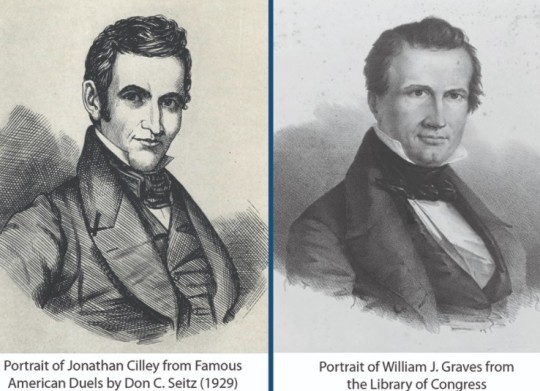
To their credit, Congress responded by passing anti-dueling legislation. But that only kept our elected representatives from murdering each other, not from behaving violently. For example, when Representative Preston Brooks (D-South Carolina) wanted to express his disapproval of the abolitionist stance of Senator Charles Sumner (R-Massachusetts), he brought a walking cane with him into the Capitol on May 22, 1856, and beat Sumner almost to death. The account of the beating on the website of the United States Senate reads as follows: “Moving quickly, Brooks slammed his metal-topped cane onto the unsuspecting Sumner's head. As Brooks struck again and again, Sumner rose and lurched blindly about the chamber, futilely attempting to protect himself. After a very long minute, it ended. Bleeding profusely, Sumner was carried away. Brooks walked calmly out of the chamber without being detained by the stunned onlookers.” The rest of the story is also instructive: Congress voted to censure Congressman Brooks, whereupon the latter resigned and was almost immediately re-elected to the House by his constituents in South Carolina. He died soon after that (and at age 37), but his place in history was secured! Sumner himself survived and spent another eighteen years in the Senate.
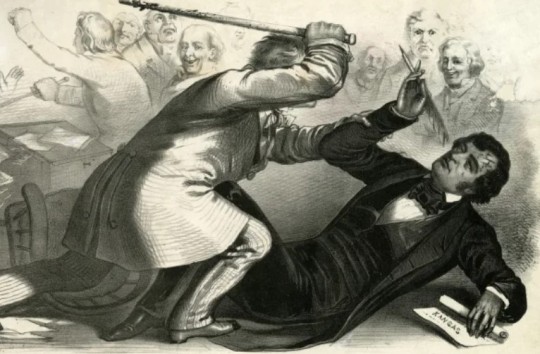
I’d like to suggest that all my readers who felt totally shocked by the events of January 6 to read The Field of Blood: Violence in Congress and the Road to Civil War by Joanne B. Freeman, a professor of history at Yale University, that was published in 2018 by Farrar, Strauss, and Giroux. I read the book when it came out and thought then (and still do think) that it should be required reading for all who imagine that, as I keep hearing, the use of violence and, even more so, the threat of violence “just isn’t us.” It’s us, all right. And Freeman’s book proves it a dozen different ways. As readers of my letters know, I read a lot of American history. But I can hardly recall reading a book that so thoroughly changed the way I thought of our government and its history.

And then there was the brawl in the House in 1858 that broke out when Laurence M. Keitt (D-South Carolina) attempted to strangle Galusha Grow (R-Pennsylvania) in the wake the latter speaking disparagingly about of the Supreme Court’s decision in Dred Scott v. Sanford to the effect that Black people were by virtue of their race excluded from American citizenship regardless of whether they were enslaved or free. The House was, to say the least, riven when Keitt went for Grow’s throat. And what happened next, Freeman writes, “was a free-for-all right in the open space in front of the Speaker’s platform featuring roughly thirty, sweaty, disheveled, mostly middle-aged congressman in a no-holds-barred brawl, North against South.” Keitt, who threw the first punch, was already known as a violent man: it was he, in fact, who took out his gun and threatened to kill any member of Congress who was part of the effort to save Charles Sumner’s life in the attack on him by Preston Brooks mentioned above.
These are the thoughts I have in my heart as the nation enters the Biden years. We have a history of violence, incivility, and public rage. What happened on January 6 was, yes, an aberration in that no one supports—or, at least, supports openly—the use of violence to make a point in the Congress. But that was not something new and shocking as much as it was a return to an earlier stage of our nation’s history, a kind of regression to the days in which violence was the language of discourse, an age in which it was possible for one member of the House openly to attempt to strangle another and then to suffer no real consequences at all. And just to wrap up the story, Representative Keitt later joined the Confederate Army and was killed on June 1, 1864 at the Battle of Cold Harbor near Mechanicsville, Virginia.
That we can renounce violence, embrace civility, listen to opposing viewpoints carefully and thoughtfully, debate with courage and respect for others’ opinions, and behave like grown-ups even when we are unlikely to have our way in some matter of public policy—I know in my heart that we can do that. Last week, I wrote about three different instances of armed insurrection against the federal government. This week, I’ve written about the use of threats of violence, and violence itself, at the highest level of government. I could go on to note that, of our first forty-five American presidents, there have been either successful or unsuccessful assassination attempts against a full twenty of them…and that that list includes every president of my own lifetime except for Dwight Eisenhower. We cannot renounce our American propensity to settle things with our fists by making believe that violence is not part of our culture. Just the opposite is true: it was part of our past and it certainly part of our present. Whether it will be part of our future—that is the question on the table. The insurrectionists who entered the Capitol on January 6 were convinced they were acting in accordance with American tradition. There’s something to that argument too…and that is why it is so crucial now that we all join together to renounce that part of our past and then to move ahead into a future characterized by mutual respect, respectful debate, and a deep sense of national unity born of pride in the best parts of our past, confidence in the present, and hope in the future.
2 notes
·
View notes
Text
I just had a (sort of) interesting discussion with a Christian.
In London, I adopted a grander form of the idea of no objective information. Of course, a lot of that is infallible, but I was particularly interested in the holy texts that I had been taught were immortally true weren’t. By then, I had given up religion, but it was still interesting to see. I found a lot of misconceptions, but also some truths: christianity was just a weird sect of Judaism for a long time after Christ died, there are apocrypha which were somewhat arbitrarily left out of the bible, Jesus wasn’t white, saints and hell aren’t described at all in the bible, neither was anything from the Iconoclasm, Satan was hardly mentioned at all, etc.
Most importantly, through discussion with a friend and information about the religion and its art, I learned that there is no non-denominational practice. The people, notably in America, who say that they don’t care what denomination or sect they are, or that they explicitly aren’t one because those are bad, are misinformed.
This all went into the larger discussion of cultural vocabularies and the nature of vision. There is no Platonic ideal, everything is different, there is no Truth.
Well, it just so happens that my training in Sunday school and the especial flavor of my family’s religiosity claimed a lot of these things. That’s why they were interesting to me, but it also presented some quandries. There lies the discussion.
I’m not religious and my family has caught the strong wind of it, but I still sometimes have sort of awkward, allegedly neutral discussions or little chats or statements that turn into unwarranted, often one-sided discussions. Today, I mentioned that I was reading about angelology recently, and found it interesting how different sects do or don’t recognize various angels, especially Uriel, as various ranks, or at all. He’s mentioned almost completely in some of the apocrypha (the book of Enoch, I think), so Orthodoxy and Catholicism have different hot takes on his, and others’, validity and rank. What’s more, these intricacies also varied in different denominations of Catholicism (one ophan or principality I think was only recognized by the Ethiopian Catholic Church) and in various protestant faiths.
And that’s interesting! It’s proof that “absolute” readings of even one text can vary widely and have interesting impacts, and whether or not you’re taught something’s true or not is likely sourced from very old opinions from St. Thomas Aquinus or (get this) Pseudo-Dioniysis or something, not just your own minister’s/priest’s/preacher’s opinion.
But beliefs are often resilient and resistant. I mentioned some of this, in really vague terms, to him, and got a lot of nothing back. On notions that it’s at all interesting to know why certain books and prophets were left out or even that it is generally worth knowing what other people think in general terms (a pretty inarguable point in a place like tumblr or college), I was assured that there is Truth and Grace, and that mixing those in different ratios results in different religiosity flavors (albeit more plainly worded). Where did he get that? Where did it come from? Isn’t it interesting to consider that concept in comparison and contrast with others? Not in his opinion.
The talk felt a little impotent not far in, but I think it shows a lot about American Christianity. Their theologies are no less biased or influenced or dynamic than any other religion, unquestionably, but it isn’t taught that way in almost any church. I haven’t been everywhere, but I went to a lot of churches, and I’ve certainly witnessed all of the TV preachers’ styles. It’s still hard to stomach sometimes, and I don’t expect a religious service to talk much about history or even cite very many sources. But the extent and style to which this is done really establishes that American religion is direct and true, straight and verbatim from the holy text, and that simply isn’t true. Who wrote your bible? Who edited the version? Who translated it, and from which version? In what based authorities are your baseline ideas rooted? It isn’t nothing, and it isn’t infallible.
I’m past the annoying part of atheism where I poo all over religion and the religious. I know it can do good, and it’s as essential to all humanity, maybe in the exact same way, as art. But I think that thinking about this really makes transparent the cause behind a lot of things, from lighthearted “I speak American!” memes to the more severe “America first” mindsets.
[Thanks for reading this far, I hope you’re having a good day.] I’m not shooting by a lesson here, but I hope that it makes someone think about how they think. It’s important. Origins can be ignored, but not without consequence. No truth is objective, more so even than “history by the victors” and “no new art” can really, fully communicate.
5 notes
·
View notes
Text
Essential Avengers: Avengers #204: Claws Across the Water!
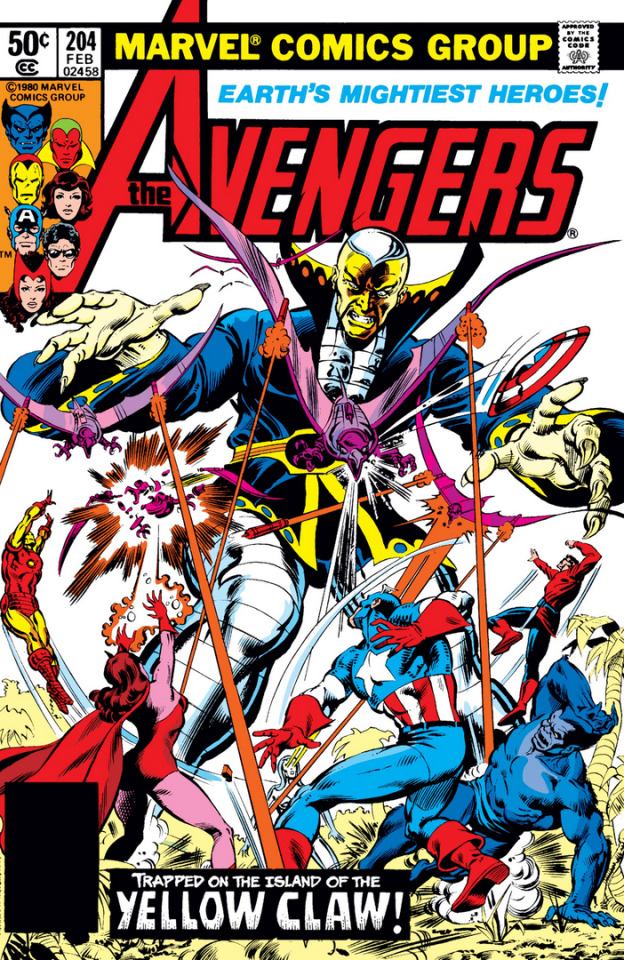
February, 1981
Welcome back, true believers! ... Eh, true believer?
I hope at least one person out there is still into this.
It has been nearly two years. I let this sort of series slip into forever hiatus. My at the time job was really eating all of my energy.
That plus the yellow peril villain two-parter that’s this and next made it hard to get motivation up to get back into it.
But in the time between then and now, I wrote a fixer-upper draft of a pretty okay novel for nanowrimo and started learning crochet. So the time not Avengersing wasn’t entirely wasted.
But now I don’t have a job!
Thus, the Avengers.
Our roster of Captain America, Iron Man, Scarlet Witch, Wasp, Vision, Beast and Wonder Man are going to fight an enormous Ming the Merciless and many fuchsia Laserbeaks from Transformers.
Its a weird but gutsy concept for a crossover.
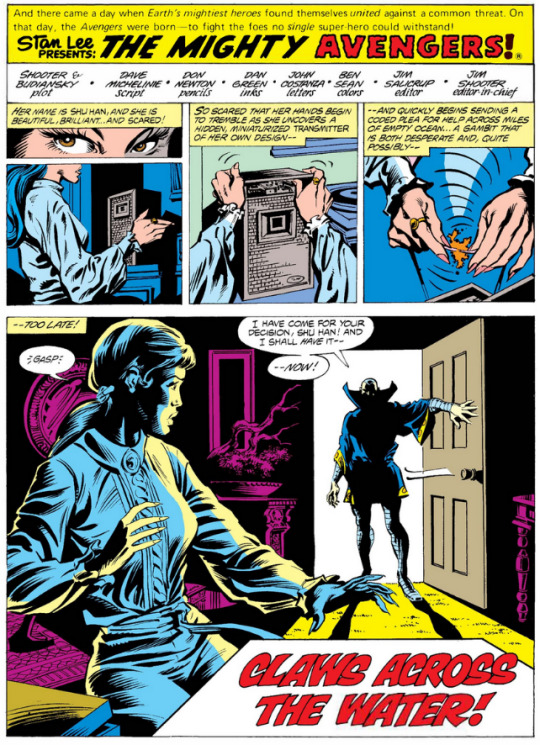
(Three cooks in the kitchen, writing-wise. Not an auspicious start.)
The issue really starts with a woman named Shu Han sending a secret message for help because she is being held captive by THE YELLOW CLAW.
Yellow Claw has offered Shu Han “honor, unlimited power, a pivotal role in the new history of the world” in exchange for something. He gives her three days to make up her mind, leaving Shu Han unsure of how much longer she can continue to resist.
And a day later, in Avengers Mansion, the Avengers say goodbye to Hawkeye. He had been hanging out with them a couple issues through the Red Ronin thing, the shudder Avengers #200 thing, and yet another Ultron thing.
And then Jarvis comes in with the mail.
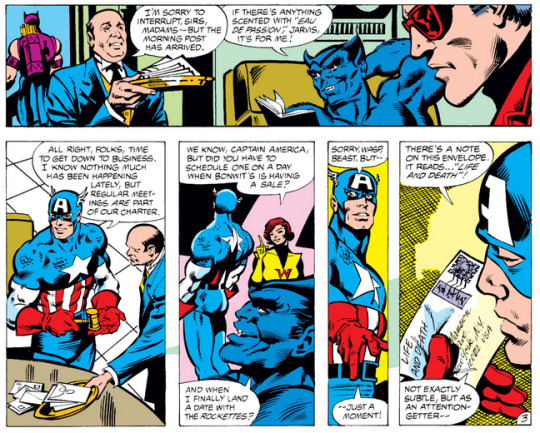
Despite the Avengers being the Avengers, all of their mail fits neatly on one tray. And one piece of mail dramatically marked LIFE AND DEATH gets Cap’s attention and he pauses their meeting to read it.
It seems that Shu Han’s secret distress message was picked up by a ham radio operator in Hong Kong.
Imagine. Two hundred and four issues in and ham radios are still a relevant plot point! And yet Rick Jones no longer is. Goes to show...
Anyway, the ham radio operator’s letter says that Shu Han says that she’s being held captive by the Yellow Claw. And since Jocasta doesn’t know who that is, it lets Cap exposit.
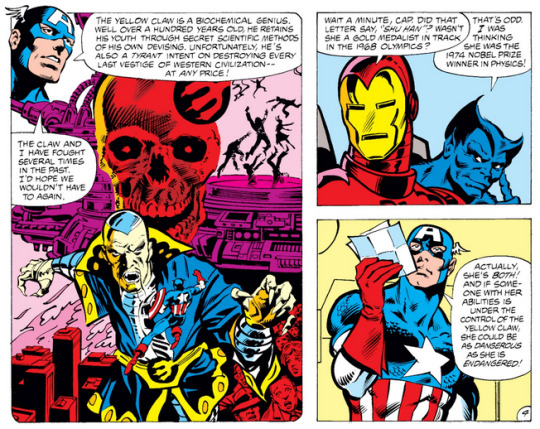
Captain America: “The Yellow Claw is a biochemical genius. Well over a hundred years old, he retains his youth through secret scientific methods of his own devising. Unfortunately, he’s also a tyrant intent on destroying every last vestige of western civilization -- at any price! The Claw and I have fought several times in the past. I’d hope we wouldn’t have to again.”
So as you might guess from this, Yellow Claw isn’t a new character. He first appeared in a self-titled book in 1956. And opposing the Yellow Claw in the Yellow Claw was FBI agent Jimmy Woo. Which is slightly better.
Anyway, Iron Man chimes in that he’s heard of Shu Han. She’s a gold medalist in track in the 1968 Olympics. And Beast has heard of her too! She won the 1974 Nobel Prize in Physics!
Both of these things! Shu Han is quite the accomplished person.
And Cap isn’t sure why the Yellow Claw wants an Olympic gold medalist who is also a physicist but it can’t be for anything good!
Vision points out that the Yellow Claw’s island is in contested waters and that actions by the Avengers could cause an international incident. And also it might just be a trap.
I mean, ham radio operator? Really? In 1981?
Captain America: “That might be true, Vision, but the fact remains that someone in trouble has asked for our help. And as acting chairman, the only thing I can say in response to that is -- AVENGERS ASSEMBLE!”
Good attitude, Cap. That’s a good attitude to have.
And the Avengers Assemble, which in this case means run out the door like they’re racing for shotgun in the Quinjet.
Running right past Jarvis who was bringing coffee and ginger cake in. Leaving him to eat the cake himself because heck, no sense letting it go to waste.
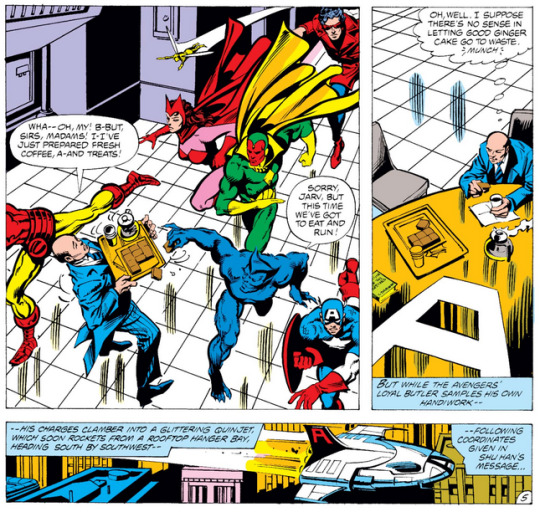
I tell ya, Jarvis is underappreciated. Do you know, I don’t think they even invited him to move into Dead Alien Mountain in the current book? Instead they got a man trapped in a gorilla to be their butler. I mean, valid, but you do Jarvis a disservice.
LATER ELSEWHERE
The Yellow Claw stands villainously on a balcony talking with a Dr. Liu and asking him about the status of a project.
Dr. Liu says that there’s almost enough “formula” to begin distribution.
Yellow Claw: “Your words please me, Liu, for I have waited long to grasp this moment. Others may have their kingdoms, their countries, even their continents. But soon, doctor, I... shall have a world!”
But the Avengers’ Quinjet appearing on radar takes some wind out of his sails and he orders the base locked down and defenses activated.
As the Quinjet circles the island, Cap decides to send Wasp and Vision to try to find a way to snoop around undetected.
Vision can just intangible through walls and Wasp can find small entrances.
Of course, when Yellow Claw says lock the base down he means lock it down because even the air vents have been covered up with plexiglass. But Wasp decides to just blow it open and fly inside.
Somehow, even with that, its Vision who makes the more conspicuous entrance, as he manages to intangible in right where some guards happen to be staring at a wall.
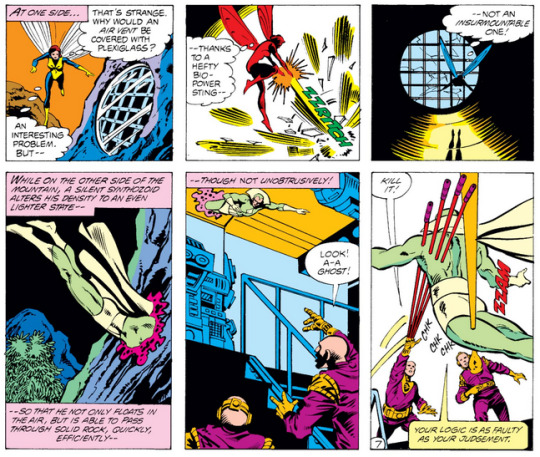
Good work, Vision.
For whatever reason, solid snaking through a dark air vent makes Wasp wistful for some time that she and Hank went in a tunnel of love. And he was so shy that she had to teach him SOMETHING.
I’m almost sorry that she stops her internal monologue anecdote when she spots the Yellow Claw.
And here our two sneakiest Avengers both prove that they need to intern with Black Panther for a weekend or something because they both make a goofus.
Vision beat up the two guards that spotted him and just left their bodies where they fell, causing alarum when they were found. See, Black Panther would have told Vision that you need to hide bodies in a locker.
And Wasp falls off the wall while trying to eavesdrop and is spotted by the Yellow Claw.
He doesn’t recognize her as a tiny woman, tiiiiiny woman, but the fact that a bug is in the base at all means that the base isn’t airtight which means one of the air vents has been compromised.
Meanwhile, the Quinjet has continued to circle because there’s no good place to land on the whole island. So Cap decides to land off the whole island and makes a water landing.
Apparently Quinjets are like seaplanes in that regard.
And then as they are trudging through the surf to come ashore, -battle transition music- A SLIME ATTACKS!
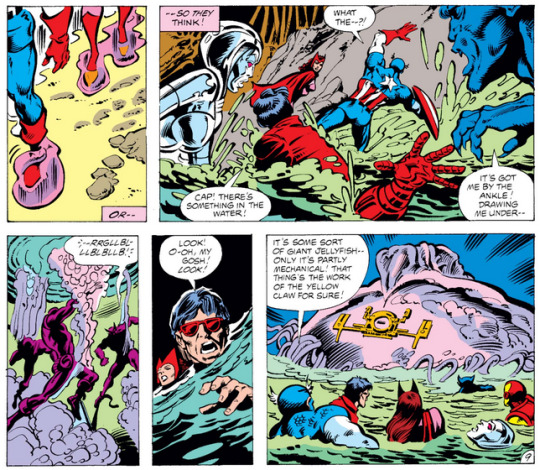
Wait, this isn’t a dragon quest. This is an Avengers. They’ve got a man in power armor and a robot woman. We’re sci-fi. Okay so its a cyborg slime.
Or a jellyfish. Or, you know what? It has a beak. Maybe its a kraken. A cykraken.
And it drags the Avengers underwater, which is just what a jellyslimefishkraken cyborg would do, if you think about it.
Beast and Scarlet Witch are SOL. Scarlet Witch’s arms are tentacled to her sides and all of her spells require a somatic component. And she hasn’t taken the feat yet to let her ignore that requirement.
And Beast doesn’t have any leverage underwater to apply his strength and agility.
Cap isn’t doing much better because he’s trying to hit the thing with his shield underwater and the water drag isn’t helping.
Jocasta is doing alright. Her eye beams work perfectly fine underwater at cutting the tentacles. Although the narration calls her a “robotrix” which... what?
And Wonder Man does fine too. Even underwater his super strength is enough to just tie the tentacles in knots.
But Iron Man goes completely limp and the jellyslimefishkraken cyborg grabs him up and sticks him right in its mouth.
But it was a ruse. He baited the thing into eating him so he can repulsor blast it from inside and destroy it, freeing the other Avengers.
Good job, Iron Man. You killed a unique, horrible lifeform.
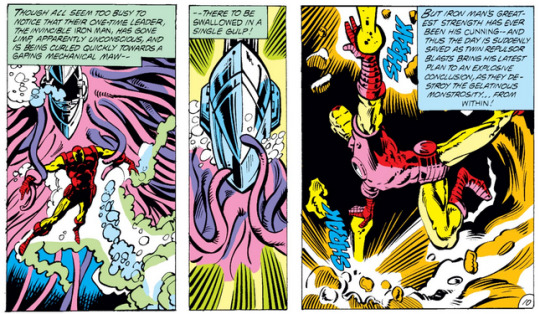
I think we can see that the real monster is Man. Comma Iron.
Meanwhile, inside the evil villain base, Vision runs into the evil villain. Who asks sincerely what the fuck Vision is doing here.
And Vision responds by immediately firing a laser at Yellow Claw.
Which. Good hustle, Vision.
Buuuut. The guy has an energy field that rebounds the energy back at Vision and knocks him out. Its a proven fact that the villain will always have something to stop Vision from soloing the plot.
Kryptonite, so to speak, is everywhere.
Yellow Claw has Vision taken to his lab to be dissected. FOR SCIENCE!
Outside, Beast goes ahead of the other Avengers to scout.
In his Beasty way, he’s goofing a little, singing the Loch Lomond song. And then he’s attacked by just so many flying blades. A lot many.
And so are the rest of the Avengers.
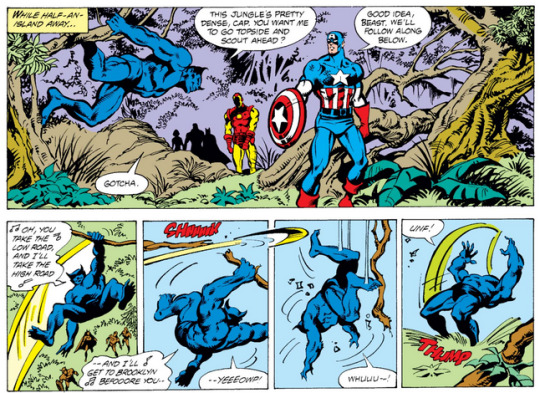
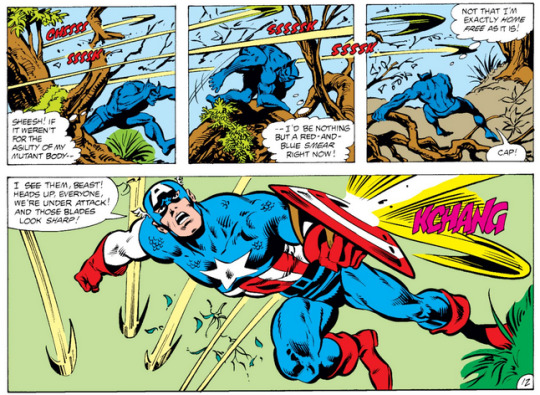

Wonder Man: “No kidding! One just clipped a lock of Jocasta’s hair -- and that stuff can take a bazooka blast!”
I really like imagining the Avengers testing that.
More than that, I’m amused imagining Jocasta’s deadpan expression as they shoot bazookas at her head.
‘The things I do to socialize.’
Anyway, the Avengers scatter to make harder targets because the blades are clearing the jungle to deny any cover to the heroes. Cap spots the blade launcher and throws his shield at it. Because that’s what he do. And it works. Because that’s what he do.
And since the jellyslimefishkraken cyborg and the “death crescents” hadn’t given the Avengers the hint, Yellow Claw appears before them towering several stories high and tells the Avengers to GTFO his island! GEEZ!
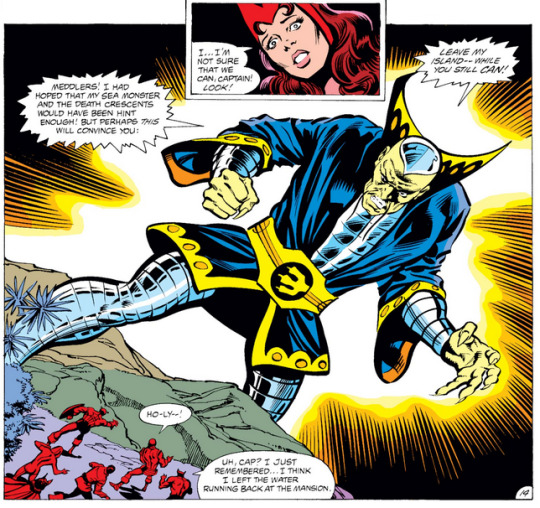
Jocasta notices that giant Yellow Claw casts no shadow and announces that it must be a hologram of some sort.
AND THEN THE METAL DEATH BIRDS
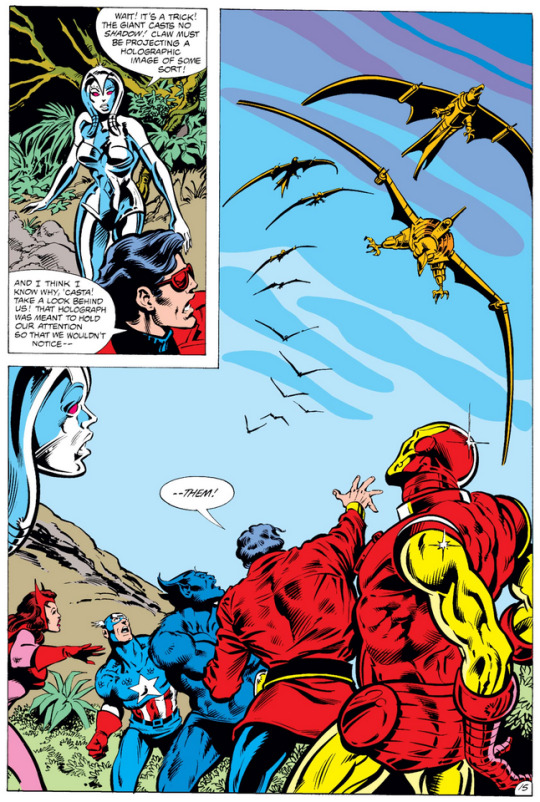
They get very angry when you point out special effect failures.
And then the Avengers do their various Avengers things.
Its an action scene. Avengers fighting robot death birds.
Iron Man jumps upside down in front of Beast to protect him from a missile. And Cap does the same right side up with his shield to protect Wanda.
I do appreciate the teamwork with immediate protecting the squishy members of the team.
Wonder Man hits one metal death bird with another. Because hitting an enemy with an enemy is great. I love grievous harm with a body.
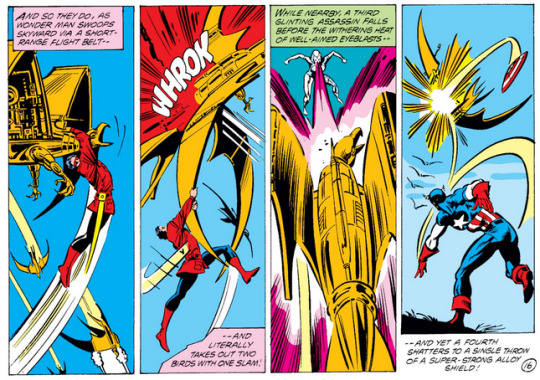
Only thing better? If some Jedi force pushed General Grievous to smash some droids. Grievous harm.
Anyway, Jocasta does her eye blasts again, to great effect again.
Captain America throws his mighty shield and even a metal death bird must yiiiiield.
And Scarlet Witch gets to do something this time because everybody is doing a thing this time. Its a real team showcase.
She. And this is totally what probability alteration is. She changes the probability that a launched missile will just turn around and blow up the robot death bird that launched it. That’s just math.
Iron Man says that since his armor powers were originally based on magnetism, he can just remotely magnetize two of the metal death birds and cause them to smash into each other.
BUT THE BEST ONE OF ALL? And the reason I bothered to synopsize the individual actions instead of just saying “and then an action scene happened”? The best one of all.
A robot death bird launches a missile at Beast and he catches it. He catches it between his toes and throws it back, blowing up the robot.
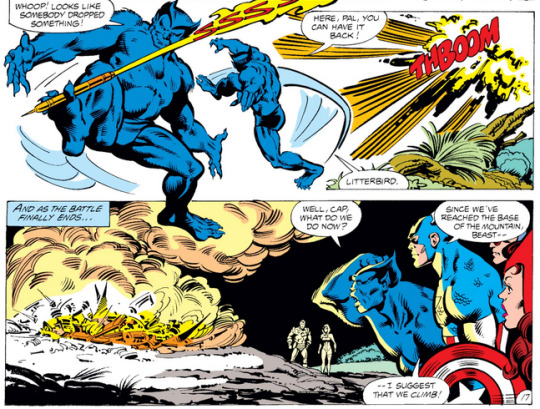
Spectacular.
So spectacular that we can assume that it instantly ended the battle just because of its sheer majesty. I can draw no other conclusions from the juxtaposition of panels.
The Avengers finally reach the base after spending most of the issue traipsing up from the beach. And the base being locked down is swiftly solved by Wonder Man and Iron Man punching the door down.
My only regret is that neither of them make a joke about knocking. C’mon guys, I can’t be writing your snappy dialogue for you decades after the fact. Publishing doesn’t work that way! I’m not writing a redub!
A bunch of Yellow Claw’s goofy guards all prepare to be ineffectual mooks in a mob brawl but Yellow Claw stops them over the intercom.
See, he’s got Vision prisoner. And while he had intended to dissect him FOR SCIENCE, hostage is equally good. So if the Avengers don’t surrender, Vision will be sliced to bits by dissection laser scalpels.
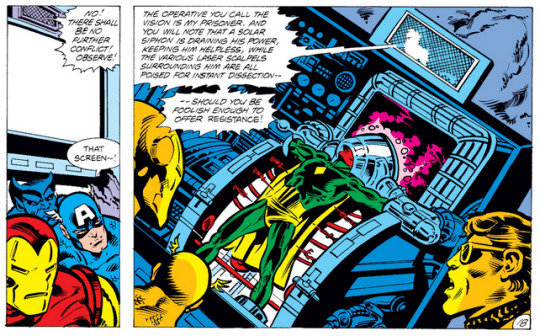
Anyway, Dr. Liu shows up through a secret door to show the Avengers in to talk to Yellow Claw.
And Yellow Claw says politely ‘why the fuck you on my island??’
Or:
Yellow Claw: “Welcome, Avengers. I am pleased to have such illustrious visitors in my humble home. In fact, there is one thing that could possibly make my bliss more complete -- the reason why you’ve invaded my island, and my privacy!”
Which in less polite terms is ‘why the fuck you on my island??’
At this point, Wasp secretly flies up to Cap and tells him she’s okay.
It’s good to reassure him that she’s not a second hostage but. There was no reason in the plot for her to have entered the base. She accomplishes no things. She arguably makes things worst but its only arguably because she didn’t alert the Yellow Claw any more than Vision already did.
I would have liked if she had tried to free Vision or sabotaged Yellow Claw’s security system or something but that’s not the direction the plot was going.
Anyway.
Yellow Claw asked a question so Cap answers. He tells Yellow Claw that the Avengers are here because they received a distress call from a woman named Shu Han who says she’s being held captive.
Yellow Claw is actually surprised. Possibly dismayed.
He recovers himself quickly and has Shu Han brought in so the Avengers can see she’s not under restraint.
She wasn’t brought to this island to be a prisoner! She was brought to be his bride!
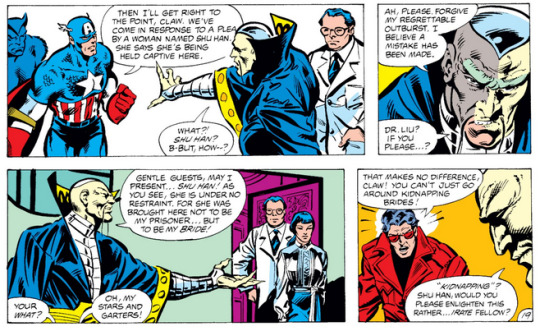
Easy mistake to make, honestly!
Wonder Man points out the should-be-obvious that hey kidnapping is kidnapping even if its for nuptials but Yellow Claw is like ha ha kidnapping no no, Shu Han fill this dumbo in.
And it is. A story.
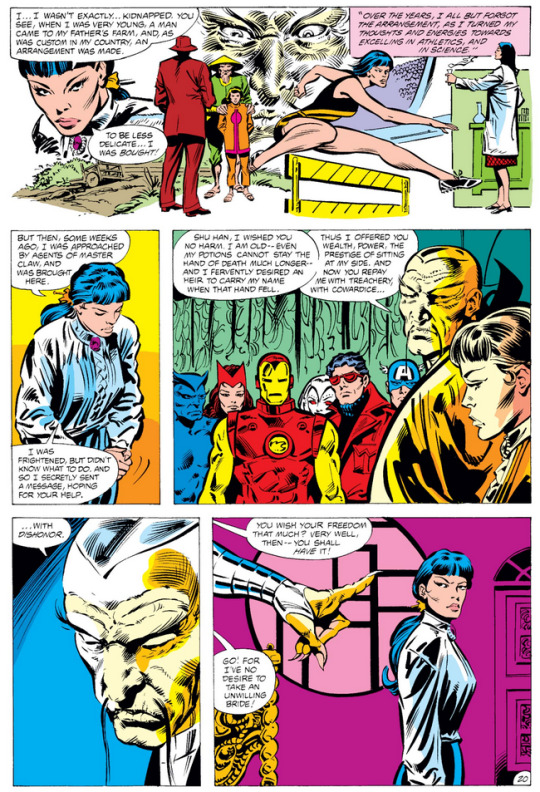
Shu Han: “I... I wasn’t exactly... kidnapped. You see, when I was very young, a man came to my father’s farm, and, as was custom in my country, an arrangement was made. To be less delicate... I was bought!
“Over the years, I all but forgot the arrangement, as I turned my thoughts and energies towards excelling in athletics, and in science.
“But then, some weeks ago, I was approached by agents of Master Claw, and was brought here. I was frightened, but didn’t know what to do. And so I secretly sent a message, hoping for you help.”
Shu Han has that mix of super good at science and sports you see in superheroes but she’s a normal genius person living her life. It’s going to be weird if she just never shows up again. But also: good for her.
Yellow Claw is just so disappointed that she dragged some randos into their interpersonal drama. And we can see now that the proposal he was proposing at her was “marry me.”
Yellow Claw: “Shu Han, I wished you no harm. I am old -- even my potions cannot stay the hand of death much longer -- and I fervently desired an heir to carry my name when that hand fell.
“Thus I offered you wealth, power, the prestige of sitting at my side. And now you repay me with treachery, with cowardice... with dishonor.
“You wish your freedom that much? Very well, then -- you shall have it!
“Go! For I’ve no desire to take an unwilling bride!”
Yellow Claw: May be a supervillain but is big into consent. I mean, except for the part where he bought a child.
Yellow Claw: May be a supervillain but is big into consent when the alternative is superheroes hanging around.
Shu Han doesn’t look super burned by his speech so maybe that’s why he does what he does. He klaps to bring out a bunch of backup wives to prove that he’s not so hurt by rejection. And that he’s got ‘mad game.’
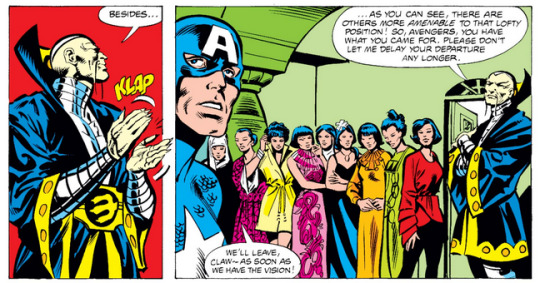
Yellow Claw: “As you can see, there are others more amenable to that lofty position! So, Avengers, you have what you came for. Please don’t let me delay your departure any longer.”
Or in less polite terms ‘GTFO!’
Cap points out that obviously they’re not going to just leave without Vision so Yellow Claw has some goons carry out Vision like a potato sack.
Iron Man and Wonder Man carry Vision with Iron Man warning that he’s not just going to forget Yellow Claw even though the guy claims he just wants to spend his final years in peace with his pile of wives.
And a good call to not take the guy strictly at his word.
As soon as the Avengers are gone Yellow Claw all about mwahahahahas and says that now his evil plan can commence.
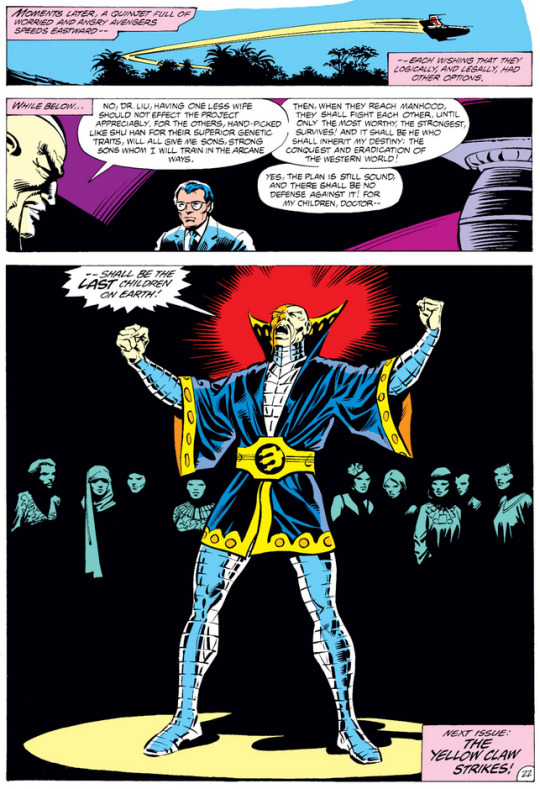
Yellow Claw: “No, Dr. Liu, having one less wife should not effect the project appreciably. For the others, hand-picked like Shu Han for their superior genetic traits, will all give me sons, strong sons whom I will train in the arcane ways.
“Then, when they reach manhood, they shall fight each other, until only the most worthy, the strongest, survives! And it shall be he who shall inherit my destiny! The conquest and eradication of the western world!
“Yes, the plan is still sound, and there shall be no defense against it! For my children, doctor -- SHALL BE THE LAST CHILDREN ON EARTH!”
As far as evil plans go, having a bunch of babies so they can fight to the death is pretty evil even before the conquest thing. And the last children on Earth thing.
Follow @essential-avengers. Or don’t. Honestly, I can’t blame you if you don’t. Throw me a like if you read and liked so I can get a sense of how many people read and liked, if you like.
#Avengers#Yellow Claw#Vision#Wasp#Captain America#Wonder Man#Iron Man#Scarlet Witch#Jocasta#beast#essential avengers#essential marvel liveblogging#honestly one of the reasons i started this up again#is i've been reading slott's iron man and thinking 'wow jocasta is great'#'wasn't i right in the middle of the era she was on the avengers?'
11 notes
·
View notes
Note
🌻🌻🌻🌻🌻
OKAY HI TIME FOR 5 RAMBLES I GUESS
it took my sister stealing my wool and then me buying wool I was more interested in to get me to learn how to knit properly, but even when I was dropping and adding stitches like a thing possessed I found tension reasonably easy to maintain
i really dislike the way literature is taught at a bunch of institutions I know of. Liek? British Literature, American Literature, World Literature????? ACTUALLY FUCK YOU.
NERVOUS CONDITIONS by Tsitsi Dangarembga has a lot to say to a great deal of English Language literature written by British Authors, and that’s part of the point, the exclusion from the canon while feeling its lingering affects of cultural malaise and distrust, and the doubling of self!
At some point I need to write my article abotu Hurricane from Miranda’s Hamilton simply because it has a lot to say about the same issue, the concept of writing back from a position of being made external, and a source of data and not a source of academic knowledge and skill, and how the metaphor of the Hurricane specifically informs Neruda and other Caribbean writers, especially Olive Senior’s engagement with and direct critique of canon
You got me started I’m sorry, I’m attaching some of the essay I wrote now
From “I Picked Up a Pen, I Wrote My Own Deliverance” Wolfe, (2015):
Neruda’s poetry mimics the thread he speaks of, making a long, winding spool down the page. Senior speaks of problems, of threads “too knotted to decipher, too clotted with blood” to be what she wants of it. She engages not only with Neruda’s demands, but admires his life and expands on his work while acknowledging her own, Jamaican context. Her thread, her link to the past, is described in the stanza 4 as “a chain-link of miles strung out across oceans/ a creole spider-work of many hands.” Senior’s country’s history is inextricably tangled in a history of slavery and the crossing, and so is her work. She expresses this in stanza 5, saying “I’ve been seeking a thread to tie up the bundle which has been growing unwieldy with the cries and the whispers of the ones I can’t name”. She ends the stanza with the proclamation that though she has forgotten some parts of her ‘thread’ that has caused her to “Let loose the hurricane”. She says of the hurricane that it “cleanses, it unburdens and purifies.” It is not an unmixed blessing, breaking the thread, though she says she will “mend it and restring with fresh beads.”
I found [the hurricane] an apt metaphor for what Senior was doing, something that I had also seen done in Hamilton. Hamilton caused a stir on Broadway due to almost all aspects of its construction. It is a hip-hop production, and has won a Pulitzer Prize and eleven Tonys; it has earnt one billion American dollars (Brokes, 2016). It draws on the story of the Founding Fathers of America, but shows it to be an immigrant story, one that almost all of America can draw on. To say it was “reimagined” thus does not ring true: the Founding Fathers were immigrants, and this is especially true of Alexander Hamilton, the protagonist of the musical, historical figure, and Caribbean born orphan. The song Hurricane happens midway through the musical, and describes his anguish about his legacy. It ends in his remembrance that he “picked up a pen/ [he] wrote his own deliverance” (emphasis mine) before leading into the chorus, a description of the hurricane that enabled Alexander Hamilton to leave the Caribbean and gain the acclaim he craved. The Hurricane is both destructive in that it destroyed the life he knew, and reconstructive, in that it was his writing about his troubles that allowed him to leave and make his own way, shaping the United States. This insistence that Hamilton be able to write his way out of trouble is larger than this. Hamilton opens the historical canon to interpretation, and “by telling the story of the founding of the country through the eyes of a bastard, immigrant orphan, told entirely by people of color, [Miranda] is saying, ‘This is our country. We get to lay claim to it.’ ” (Mead, 2015).
6 notes
·
View notes
Text
Futurology: how a group of visionaries looked beyond the possible a century ago and predicted today's world
by Max Saunders

We need more blue-sky thinking. Yolanda Sun/Unsplash
From shamanic ritual to horoscopes, humans have always tried to predict the future. Today, trusting predictions and prophecies has become part of daily life. From the weather forecast to the time the sat-nav says we will reach our destination, our lives are built around futuristic fictions.
Of course, while we may sometimes feel betrayed by our local meteorologist, trusting their foresight is a lot more rational than putting the same stock in a TV psychic. This shift toward more evidence-based guesswork came about in the 20th century: futurologists began to see what prediction looked like when based on a scientific understanding of the world, rather than the traditional bases of prophecy (religion, magic, or dream). Genetic modification, space stations, wind power, artificial wombs, video phones, wireless internet, and cyborgs were all foreseen by “futurologists” from the 1920s and 1930s. Such visions seemed like science fiction when first published.
They all appeared in the brilliant and innovative “To-Day and To-Morrow” books from the 1920s, which signal the beginning of our modern conception of futurology, in which prophecy gives way to scientific forecasting. This series of over 100 books provided humanity – and science fiction – with key insights and inspiration. I’ve been immersed in them for the last few years while writing the first book about these fascinating works – and have found that these pioneering futurologists have a lot to teach us.
In their early responses to the technologies emerging then – aircraft, radio, recording, robotics, television – the writers grasped how those innovations were changing our sense of who we are. And they often gave startlingly canny previews of what was coming next, as in the case of Archibald Low, who in his 1924 book Wireless Possibilities, predicted the mobile phone: “In a few years time we shall be able to chat to our friends in an aeroplane and in the streets with the help of a pocket wireless set.”
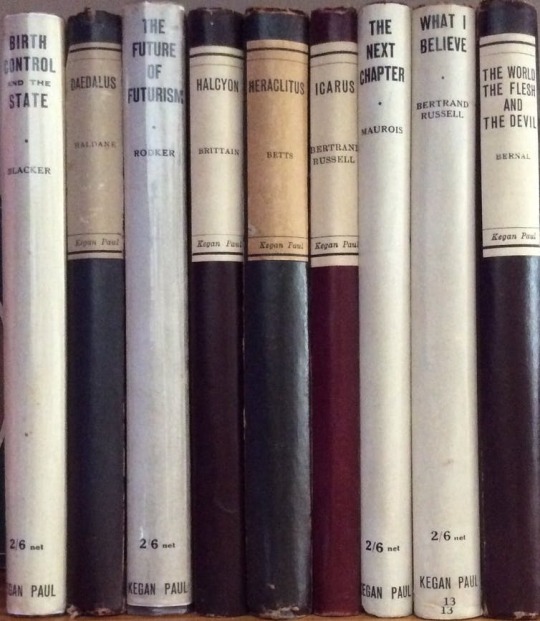
Some of the books in the series. Max Saunders, Author provided
My immersion in these historic visions of the future has also shown me that looking at this collection of sparkling projections can teach us a lot about current prediction attempts, which today are dominated by methodologies claiming scientific rigour, such as “horizon scanning”, “scenario planning” and “anticipatory governance”. Unlike the corporate, bland way in which most of this professional future gazing takes place within government, think-tanks and corporations, the scientists, writers, and experts who wrote these books produced very individual visions.
They were committed to thinking about the future on a scientific basis. But they were also free to imagine futures that would exist for other reasons than corporate or governmental advantage. The resulting books are sometimes fanciful, but their fancy occasionally gets them further than today’s more cautious and methodical projections.
Forecasting future discoveries
Take J B S Haldane, the brilliant mathematical geneticist, whose book Daedalus; or: Science and the Future inspired the whole series in 1923. It ranges widely across the sciences, trying to imagine what remained to be done in each.
Haldane thought the main work in physics had been done with the Theory of Relativity and the development of quantum mechanics. The main tasks left seemed to him to be the delivery of better engineering: faster travel and better communications.
Chemistry, too, he saw as likely to be concerned more with practical applications, such as inventing new flavours or developing synthetic food, rather than making theoretical advances. He also realised that alternatives would be needed to fossil fuels and predicted the use of wind power. Most of his predictions have been fulfilled (though we’re still waiting eagerly for those new flavours, which have to be better than salted caramel).

The first cultured hamburger, 2013. World Economic Forum, CC BY
It’s chastening, though, how much even such a clear-sighted and ingenious scientist missed, especially in the future of theoretical physics. He doubted nuclear power would be viable. He couldn’t know about future discoveries of new particles leading to radical changes to the model of the atom. Nor, in astronomy, could he see the theoretical prediction of black holes, the theory of the big bang or the discovery of gravitational waves.
But, at the dawn of modern genetics, he saw that biology held some of the most exciting possibilities for future science. He foresaw genetic modification, arguing that: “We can already alter animal species to an enormous extent, and it seems only a question of time before we shall be able to apply the same principles to our own.” If this sounds like Haldane supported eugenics, it’s important to note that he was vocally opposed to forced sterilisation, and didn’t subscribe to the overtly racist and ableist eugenics movement that was en vogue in America and Germany at the time.
But the development that caught the eye of so many readers was what Haldane called “ectogenesis” – his term for growing embryos outside the body, in artificial wombs. Many of the other contributors took up the idea, as did other thinkers – the most notable being Haldane’s close friend Aldous Huxley, who was to use it in Brave New World, with its human “hatcheries” cloning the citizens and workers of the future. It was also Haldane who coined the word “clone”.
Ectogenesis still seems like science fiction. But the reality is getting closer. It was announced in May 2016 that human embryos had been successfully grown in an “artificial womb” for 13 days – just one day short of the legal limit, which prompting an inevitable ethical row. And in April 2017 an artificial womb designed to nurture premature human babies was successfully trialled on sheep. So even that prediction of Haldane’s may well be realised soon, perhaps within a century after it was made. Although artificial wombs will probably be used, at first, as a prosthesis to cope with medical emergencies, before they become routine options, on a par with caesareans or surrogacy.
youtube
Science, then, was not just science for these writers. It had social and political consequences, as does prediction. Many of the contributors of this series were social progressives, in sexual as well as political matters. Haldane looked forward to the doctor taking over from the priest and science separating sexual pleasure from reproduction. In ectogenesis, he foresaw that women could be relieved of the pain and inconvenience of bearing children. As such, the idea could be seen as a feminist thought experiment – though some feminists might now see it as a male attempt to control women’s bodies.
What this reveals is how shrewd these writers were about the controversies and social proclivities of the age. At a time when too many thinkers were seduced by the pseudoscience of eugenics, Haldane was scathing about it. He had better ideas about how humanity might want to transform itself.
What this reveals is how shrewd these writers were about the controversies and social proclivities of the age. At a time when too many thinkers were seduced by the pseudoscience of eugenics, Haldane was scathing about it. He had better ideas about how humanity might want to transform itself. While most of the scholars musing on eugenics merely supported white supremacy, Haldane’s motives suggest he’d be delighted at the advent of technologies like CRISPR – a method by which humankind could better itself in ways that mattered, like curing congenital disease.
Alternate futures
Some of To-Day and To-Morrow’s predictions of technological developments are impressively accurate, such as video phones, space travel to the moon, robotics and air attacks on capital cities. But others are charmingly inaccurate.
Oliver Stewart’s 1927 volume, Aeolus or: The Future of the Flying Machine, argued that British craftsmanship would triumph over American mass production. He was excited by autogiros – small aircraft with a propeller for thrust and a freewheeling rotor on top, for which there was a craze at the time. He thought travellers would use those for short-haul flights, transferring for long-haul to flying boats – passenger planes with boat-like bodies that could take off from, and land on, the sea. Flying boats certainly had their vogue for glamorous voyages across the ocean, but disappeared as airliners became bigger and longer range and as more airports were built.

The Dornier Do X was the largest, heaviest, and most powerful flying boat in the world when it was produced by the Dornier company in Germany in 1929. Wikipedia, CC BY
The To-Day and To-Morrow series, like all futurology, is full of such parallel universes. Paths history could well have taken, but didn’t. In the rousing 1925 feminist volume Hypatia or: Woman and knowledge, Bertrand Russell’s wife Dora proposed that women should be paid for household work. Unfortunately, this has not come to pass either.
The film critic Ernest Betts, meanwhile, writes in 1928’s Heraclitus; or The Future of films that “the film of a hundred years hence, if it is true to itself, will still be silent, but it will be saying more than ever”. His timing was terrible, as the first “talkie”, The Jazz Singer, had just come out. But Betts’s vision of film’s distinctiveness and integrity – the expressive possibilities open to it when it brackets off sound – and of its potential as a universal human language, cutting across different linguistic cultures, remains admirable.
The difficulty with future thinking is to guess which of the forking paths leads to our real future. In most of the books, moments of surprisingly accurate prediction are tangled up with false prophecies. This isn’t to say that the accuracy is just a matter of chance. Take another of the most dazzling examples, The World, the Flesh and the Devil by the scientist J D Bernal, one of the great pioneers of molecular biology. This has influenced science fiction writers, including Arthur C Clarke, who called it “the most brilliant attempt at scientific prediction ever made”.
Bernal sees science as enabling us to transcend limits. He doesn’t think we should settle for the status quo if we can imagine something better. He imagines humans needing to explore other worlds and to get them there he imagines the construction of huge life-supporting space stations called bio-spheres, now named after him as “Bernal spheres”. Imagine the international space station, scaled up to small planet or asteroid size.
youtube
Brain in a vat
When Bernal turns to the flesh, things get rather stranger. A lot of the To-Day and To-Morrow writers were interested in how we use technologies as prosthesis, to extend our faculties and abilities through machines. But Bernal takes it much further. First, he thinks about mortality – or more specifically – about the limit of our lifespan. He wonders what science might be able to do to extend it.
In most deaths the person dies because the body fails. So what if the brain could be transferred to a machine host, which could keep it, and therefore the thinking person, alive much longer?
Bernal’s thought experiment develops the first elaboration of what philosophers now call the “brain in a vat” hypothesis. Except they’re usually concerned with questions of perception and illusion (if my brain in a vat was sent electrical signals identical to the ones sent by my legs, would I think I was walking? Would I be able to tell the difference?). But Bernal has more pragmatic ends in view. Not only would his Dalek-like machines be able to extend our brain life, they’d be able to extend our capabilities. They would give us stronger limbs and better senses.
youtube
Bernal wasn’t the first to postulate what we’d now call the cyborg. It had already appeared in pulp science fiction a couple of years earlier – talking, believe it or not, about ectogenesis.
But it’s where Bernal takes the idea next that is so interesting. Like Haldane’s, his book is one of the founding texts of transhumanism – the idea that humanity should improve its species. He envisions a small sense organ for detecting wireless frequencies, eyes for infra-red, ultra-violet and X-rays, ears for supersonics, detectors of high and low temperatures, of electrical potential and current.
With that wireless sense Bernal imagined how humanity could be in touch with others, regardless of distance. Even fellow humans across the galaxy in their biospheres could be within reach. And, like several of the series’ authors, he imagines such interconnection as augmenting human intelligence, of producing what science fiction writers have called a hive mind, or what Haldane calls a “super-brain”.
It’s not AI exactly because its components are natural: individual human brains. And in some ways, coming from Marxist intellectuals like Haldane and Bernal, what they’re imagining is a particular realisation of solidarity. Workers of the world uniting, mentally. Bernal even speculates that if your thoughts could be broadcast direct to other minds in this way, then they would continue to exist even after the individual brain that thought them had died. And so would offer a form of immortality guaranteed by science instead of religion.
Blind spots
But from a modern point of view what’s more interesting is how Bernal effectively imagined the world wide web, more than 60 years before its invention by Tim Berners Lee. What neither Bernal, nor any of the To-Day and To-Morrow contributors could imagine, though, was the computers needed to run it – even though they were only about 15 years away when he was writing. And it is these computers that have so ramped up and transformed these early attempts at futurology into the industry it is today.
How can we account for this computer-shaped hole at the centre of so many of these prophecies? It was partly that mechanical or “analogue” computers such as punched card machines and anti-aircraft gun “predictors” (which helped gunners aim at rapidly moving targets) had become so good at calculation and information retrieval. So good, in fact, that to the inventor and To-day and To-morrow author H Stafford Hatfield what was needed next was what he called “the mechanical brain”.
So these thinkers could see that some form of artificial intelligence was required. But even though electronics were developing rapidly, in radios and even televisions, it didn’t yet seem obvious – it didn’t even seem to occur to people – that if you wanted to make something that functioned more like a brain it would need to be electronic, rather than mechanical or chemical. But that was exactly the moment when neurological experiments by Edgar Adrian and others in Cambridge were beginning to show that what made the human brain tick was actually the electrical impulses that powered the nervous system.
Just 12 years later, in 1940 – before the development of the first digital computer, Colossus at Bletchley Park – it was possible for Haldane (again) to see that what he called “Machines that Think” were beginning to appear, combining electrical and mechanical technologies. In some ways our situation is comparable, as we sit poised just before the next great digital disruption: AI.

A Colossus codebreaking computer, 1943. Wikimedia Commons
Bernal’s book is a fascinating example of just how far extended future thinking can go. Further than actual science, or science fiction, or philosophy or anything else. But it also shows where it reaches its limits. If we can understand why the To-Day and To-Morrow authors were able to predict biospheres, mobile phones and special effects, but not the computer, the crisis in obesity, or the resurgence of religious fundamentalisms, then maybe we can learn about the blind spots in our own forward vision and horizon scanning.
Beyond the simple wows and comedic effects of these hits and misses, we need more than ever to learn from these past examples about the potential and dangers of future thinking. We would do well to look closely at what might helps us to be better futurologists, as well as at what might be blocking our vision.
Yesterday and today
The pairing of scientific knowledge and imagination in these books created something unique – a series of hypotheticals somewhat lodged between futurology and science fiction. It is this sense of hopeful imagination that I think urgently needs to be injected back into today’s predictions.
Because computers have transformed contemporary futurology in major ways: especially in terms of where and how it is carried out. As I have mentioned, computer modelling of the future mainly happens in businesses or organisations. Banks and other financial companies want to anticipate shifts in the markets. Retailers need to be aware of trends. Governments need to understand demographic shifts and military threats. Universities want to drill down into the data of these or other fields to try to understand and theorise what is happening.
To do this kind of complex forecasting well, you have to be a fairly large corporation or organisation with adequate resources. The bigger the data, the hungrier the exercise becomes for computing power. You need access to expensive equipment, specialist programmers and technicians. Information that citizens freely offer to companies such as Facebook or Amazon is sold on to other companies for their market research – as many were shocked to discover in the Cambridge Analytica scandal.
The main techniques which today’s governments and industries use to try to prepare for or predict the future – horizon scanning and scenario planning – are all well and good. They may help us nip wars and financial crashes in the bud – though rather obviously, they don’t always get it right either. But as a model for thinking about the future more generally, or for thinking about other aspects of the future, such methods are profoundly reductive.
They’re all about maintaining the status quo, about risk aversion. Any interesting ideas or innovative speculations that are about anything other than risk avoidance are likely to get pushed aside. The group nature of think-tanks and foresight teams also has a levelling down effect. Future thinking by committee has a tendency to come out in bureaucratese: bland, impersonal, insipid. The opposite of science fiction.

Horizon scanning doesn’t tend to produce any particularly exciting ideas. Zhao jiankang/Shutterstock.com
Which is perhaps why science fiction needs to put its imagination in hyperdrive: to boldly go where the civil servants and corporate aparatchiks are too timid to venture. To imagine something different. Some science fiction is profoundly challenging in the sheer otherness of its imagined worlds.
That was the effect of 2001 or Solaris, with their imagining of other forms of intelligence, as humans adapt to life in space. Kim Stanley Robinson takes both ideas further in his novel 2312, imagining humans with implanted quantum computers and different colony cultures as people find ways of living on other planets, building mobile cities to keep out of the sun’s heat on Mercury, or terraforming planets, even hollowing out asteroids to create new ecologies as art works.
When we compare To-Day and To-Morrow with the kinds of futurology on offer nowadays, what’s most striking is how much more optimistic most of the writers were. Even those like Haldane and Vera Brittain (she wrote a superb volume about women’s rights in 1929) who had witnessed the horrors of modern technological war, saw technology as being the solution rather than the problem.
Imagined futures nowadays are more likely to be shadowed by risk, by anxieties about catastrophes, whether natural (asteroid collision, mega-tsunami) or man-made (climate change and pollution). The damage industrial capitalism has inflicted on the planet has made technology seem like the enemy now. Certainly, until anyone has any better ideas, and tests them, reducing carbon emissions, energy waste, pollution, and industrial growth seem like our best bet.
Imagining positive change
The only thing that looks likely to convince us to change our ways is the dawning conviction that we have left it too late. That even if we cut emissions to zero now, global warming has almost certainly passed the tipping point and will continue to rise to catastrophic levels regardless of what we do to try to stop it.
That realisation is beginning to generate new ideas about technological solutions – ways of extracting carbon from the atmosphere or of artificially reducing sunlight over the polar ice caps. Such proposals are controversial, attacked as encouragements to carry on with Anthropocene vandalism and expect someone else to clear up our mess.
But they might also show that we are at an impasse in future thinking, and are in danger of losing the ability to imagine positive change. That too is where comparison with earlier attempts to predict the future might be able to help us. They could show us how different societies in different periods have different orientations towards the past or the future.
Where the modernism of the 1920s and 30s was very much oriented towards the future, we are more obsessed with the past, with nostalgia. Ironically, the very digital technology that came with such a futuristic promise is increasingly used in the service of heritage and the archive. Cinematic special effects are more likely to deliver feudal warriors and dragons, rather than rockets and robots.
But if today’s futurologists could get back in touch with the imaginative energies of their predecessors, perhaps they would be better equipped to devise a future we could live with.

About The Author:
Max Saunders is Professor of English at King's College London
This article is republished from The Conversation under a Creative Commons license.
This article is part of Conversation Insights
The Insights team generates long-form journalism derived from interdisciplinary research. The team is working with academics from different backgrounds who have been engaged in projects aimed at tackling societal and scientific challenges.
13 notes
·
View notes
Photo
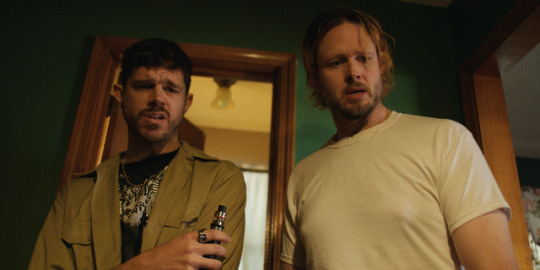
Life in Film: Daniel Scheinert.
The Death of Dick Long director Daniel Scheinert (of “the Daniels”) talks stressful comedy, the South and Richard Linklater as he answers our life-in-film questionnaire.
Daniel Scheinert made a splash on the indie-movie scene in 2016 with the surreal and crude Swiss Army Man, alongside directing partner Dan Kwan. For his second feature with A24—and first away from the Daniels—Scheinert returns to his Southern roots with The Death of Dick Long.
Set in small-town Alabama, the story follows bandmates Zeke and Earl doing everything they can to avoid having to explain how their friend Dick Long died the night before. Billy Chew wrote the script, and Scheinert broke out in a nervous sweat when he read it. “I love comedies that are stressful. I get bored in movie theaters a lot and this was not boring.”
Chew, one of Scheinert’s BFFs, also has professional history with the Daniels: he’s acted in their shorts, and co-directed the interactive documentary The Gleam with Scheinert. “He lived in Alabama for a long time and that’s where I’m from, so I got excited about making his movie while Dan Kwan wrote the first draft of our new movie.”
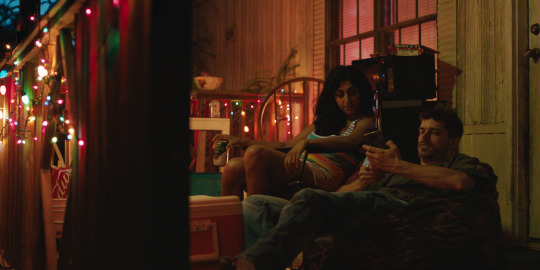
Sunita Mani and Andre Hyland in ‘The Death of Dick Long’.
That’s right: the Daniels are far from over. It’s just that other-Dan is “not from Alabama so it’s a fun chance to explore the few things that are not in [the Daniels’] Venn diagram of interests. But Dan and I have been busy, we’re still trucking, we’ve got more movies to make.”
Premiering at the 2019 Sundance Film Festival—just as his “arty farty” debut did—The Death of Dick Long is, according to Letterboxd reviews, “pretty bonkers, surprisingly touching, melancholic, and—in certain aspects—relatable,” with “early Coen brothers” vibes in its portrayal of loveable idiots on the run. The best compliment of all for Scheinert? It is “the most Alabama film of all time.”
“With this one I just wanted people who were colorful and interesting, who had Southern roots, because one of my least favorite things is Hollywood actors faking Southern accents. The cast is like a mix of folks who travelled in and there’s a lot of folks around Birmingham, Alabama where I grew up. Sarah Baker, who plays Officer Dudley, is a super-talented pedigree actress who travelled in and did all her scenes with Janelle Cochrane, a local actress who did theater in Birmingham. She plays Sheriff Spenser and that’s just how she acts [in real life].”
Now that The Death of Dick Long is out in the world, one of Scheinert’s favorite things is to pull out his phone and record audience reactions. “I have ten recordings on my phone of different theaters in different parts of America reacting to this movie because it’s fun.” He argues that laughter isn’t the only fun reaction to get out of an audience: “It’s just as fun to get absolute silence if they’re leaning forward and hanging on every word. It’s really fun to get people whispering or gasping or uncomfortably moving around in their seats, and this movie gets all of it combined. It’s rewarding.”
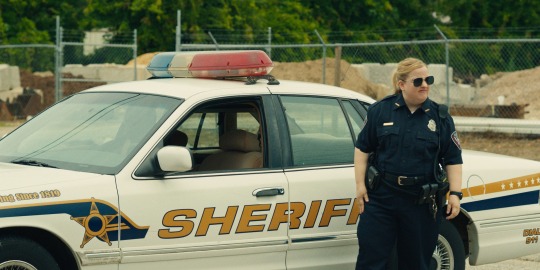
Sarah Baker in ‘The Death of Dick Long’.
Daniel, it’s time for your life-in-film interrogation. What was the film that made you want to become a filmmaker?
Daniel Scheinert: Oh man. It was the show Jackass. I think there’s a whole generation of filmmakers who saw Jackass and were like “you just filmed your friends doing stuff and that’s content?!” My favorite movies look like they were fun to make, which I feel is true of all of Spike Jonze’s stuff too.
What’s a bizarre movie that you recommend to everyone?
Not to everybody, but this year I’ve been telling people to see Greener Grass, which is a bat-shit crazy movie that a bunch of comedians shot over in Georgia that just is a crazy satire of nuclear families.
Since Hallowe’en is coming up, what’s your favorite scary movie?
White Chicks. So scary. I think their white faces are the scariest monsters in movie history. I don’t watch it every Hallowe’en but that’s one of my favorite scary movies.
Which dark comedies and crime movies did you watch in preparation for The Death of Dick Long?
I rewatched episodes of Breaking Bad because I love how information is revealed in that show. It’s fun and colorful and vivid. Billy and I rewatched American Movie, which is one of our all-time favorites about buddies. That egotistical guy who just wants to make his goddamn movie, wilfully ignorant of the trainwreck of his life, is so relatable. A while ago I made Billy watch The Celebration with me, which is… some people would call it a drama, but I think it’s one of the funniest movies ever. It’s a European film about a 60th birthday party going horribly, horribly wrong.

‘The Death of Dick Long’ director Daniel Scheinert.
Which film do you think best represents people from the Southern states?
I love that question and I was having a hard time coming up with one. Last year I watched Hale County This Morning, This Evening. It’s an arthouse documentary about rural, black, Southern life. I grew up near there and I had never seen the images from that movie [on screen]. Some of them were very familiar but some of them were not.
What’s your go-to comfort movie? The one you re-watch every year, you’re down to watch any time (and how many times do you think you’ve seen it)?
It’s Eternal Sunshine of the Spotless Mind. I’ve probably seen it start-to-finish like twelve times. I watch pieces of it and listen to the soundtrack all the time. Or Wet Hot American Summer. Similar number—maybe twelve.
What film do you have fond memories of watching with your parents?
That was a fun question. Probably, Airplane!. I watched Jackass 2 with my dad and he laughed so much, it was really fun. He’s a very serious man, until he’s not.
What’s a classic that you just couldn’t get into?
Would you call High Fidelity a classic? The “guy moping about his ex-girlfriend” genre is just rough for me. Maybe I’ll try it again someday but High Fidelity, man, is tough.
[Daniel later sent us Billy Chew’s answer: Gone With the Wind. “He hates it. I've never seen it. But you look back and it’s a super-problematic celebration of the good ol’ days before the Civil War. Fuck that.”]
Do you have a classic that you’re embarrassed to say you haven’t watched?
So many. I missed some Martin Scorsese movies. I’ve never seen Raging Bull. I know. I was talking about this the other day, I don’t know if I’ve ever seen Back to the Future Part II from start-to-finish. I think I’ve seen pieces of it on TV. Dan Kwan is a super-fan. I don’t know if I’ve seen [the first Back to the Future] either. That’s embarrassing. I always wail on time-travel movies and I haven’t even watched these.
Which film was your entry point to foreign-language cinema?
I don’t know if Miyazaki counts because they dubbed Princess Mononoke so it’s probably Amélie. Actually, as a kid I was obsessed with the black-and-white Godzilla movies, and I would watch all of them, subtitled. I’d invite my friends over and they would get bored while I would get so excited about that monster smashing those cities.

Virginia Newcomb in ‘The Death of Dick Long’.
What movie scene makes you cry the hardest?
It’s Freedom Writers. Anything with inner-city kids expressing themselves just strikes me out, and while that movie is not perfect, once the kids start reading their poems and their stories to the class, I just lost it. Later I found out that Richard LaGravenese, who made that movie, cast real kids and had them tell their real stories, so that’s probably why it hit me so hard. It wasn’t just a screenwriter.
What director do you envy the most?
I always talk about this because my answer is Richard Linklater. As a kid, I wanted to find a filmmaker who I could look up to. I needed to find one who made multiple good movies because I want a whole career, so that shortened the list. But then also I needed filmmakers who are not assholes and that cut the list way down because you find out all your heroes are assholes. And then I needed to find people who were also good parents, you know? Because so many filmmakers are divorced or don’t see their families, and basically it just [came] down to Richard Linklater.
What’s a film that you wish you had made?
Let me think. What’s that movie, I always forget the name, where he’s getting out of the limousine? It’s an arthouse film with, uh. [Daniel starts googling]. It’s French… Holy Motors! You ever seen Holy Motors? It’s a batshit crazy movie starring Denis Lavant. He’s just the best. It’s just him getting in and out of a limousine and wandering through a bunch of absurdist short films with each one zany in a different way.
What’s the best film of the decade, in your opinion?
That’s a tough one. It’s probably Moonlight. I love Moonlight so much. For me, it opened up empathy I didn’t know I had. After the third act of that film, I felt I grew as a person. My other answer, I googled it, is not this decade but it came out in the last ten years, is Cloudy with a Chance of Meatballs. It’s just a perfect film. So I’m a super-fan of Moonlight and Cloudy with a Chance of Meatballs.
A24 is held in incredibly high regard—both in the industry and by the Letterboxd community—for the sheer quality of its output. As a filmmaker, what is the day-to-day experience of being in their camp like?
I feel spoiled. Half of my favorite movies I go to see and I go “Oh man, that’s the logo in front of my movie!” I got to meet a handful of the other filmmakers, which I feel so fortunate to have done. They’re such a hands-off company in a really cool way. I just feel like I got to make my movie and they just trusted me. They’re not helicopter parents.
‘The Death of Dick Long’ is distributed by A24 and in US cinemas now.
#daniel scheinert#dan kwan#the death of dick long#swiss army man#a24#film director#director#filmmaker#q&a#letterboxd
3 notes
·
View notes
Text
I Bet You Never Heard This One In School
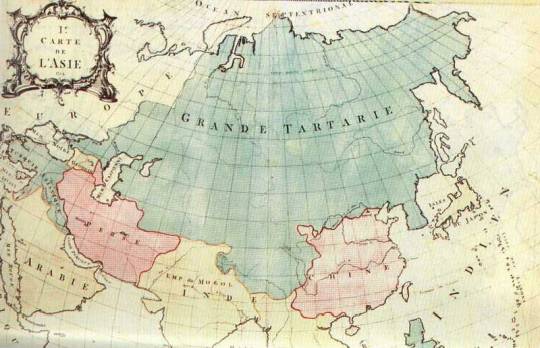
(Image is from a map of the year 1754)
The vast empire of Tartary is a country that appears on ancient maps.
It had worldwide influence and once covered North and South America, Australia, New Zealand most of Russia, China, Europe, Japan, India and Korea.
For the most part the citizens of this country were led by their own guidance of natural law honoring truth and integrity.
They enjoyed a high standard of living and dwelt in harmony with nature.
They built amazing edifices all over the world.
The wonderous cathedrals of Europe and the enormous aqueducts in southern Europe and in Mexico.
The Grand Canal in China and the Erie Canal in America.
The fabulous outside arenas around the Mediterranean Sea.
The Coliseum in Rome and the magnificent temples in St. Petersburg Russia.
They lived in luxuriant villas.
They made ziggurats, star forts, dolmens and earthen mounds all of which utilized Etheric natural energy.
They created exquisite statues and crafted golden ornaments.
They built the Great Wall in what is now China.
Marco Polo wrote an extensive and detailed account of Asia in the 13th and 14th centuries and did not even mention a wall.
The Great Wall is not seen on any maps pre-dating the late 1600’s.
So most of it’s construction occurred in 1700’s and it was built to keep the encroaching Chinese out of Tartaria.
The openings on the wall are on the north side towards the former Tartary not on the south China facing side.
It should be called the Great Wall of Tartaria.
The further back in time you go the more advanced it gets.
There are many pyramids of different kinds.
Megalithic temples hewn out of solid rock.
The Ellora Caves in India.
The colossal underground monolithic churches of Lalibela Ethiopia.
Extensive underground tunnel systems.
The astonishing Serapeum of Saqqara in Egypt.
The earlier the monolithic stone the bigger it is and the more precision it is cut with.
The earlier the structure the more incapable we are of replicating it.
Never was mortar used.
In past ages the world was more diverse.
Skeletons of giants are found on all continents.
And remains of beings with elongated skulls.
Graveyards of little people and horned human like entities have been unearthed.
Now it is as if these beings have never existed.
Like the Tartarians they are never mentioned.
We live in a virtual reality where true history is ignored and covered up.
A totally false narrative is taught.
Fantasies have replaced truth and everything is pushed way back to the remote past.
Older advanced structures are credited to local people who came later who have no idea how to build them.
Deception has been utilized to push history back a thousand years and create an artificial dark age.
The time of Jesus was less than 1000 years ago.
In the Middle Ages the i and J before numbers designated Jesus. Not the number one.
For example i346 is 346 years after the time of Jesus. It is not 1346.
Way back in the Old Testament at the time immediately following the Exodus it states that the Israelites used the Arc of the Covenant as a weapon of war.
Against the Amorites, Midianites and Philistines.
So the use of energy weapons has been going on for over a thousand years.
It was perfected to the point where it was able to take out many millions of Tartarians.
The energy weapons melted cities and destroyed the civilizations of Egypt, Greece and Rome which were approximately of the same time period as Jesus and were heavily influenced by Tartaria.
Not only are they pushed way back into remote history, the extent of their empires have been fabricated.
Destroying the pyramid complex was the first objective of the Israelites.
Puma Punku which is part of the Tiahuanacu complex in Bolivia had interlocking megaliths of andesite and diorite.
These are types of granite only surpassed in hardness by diamonds but they were somehow carved with laser like flatness.
Now they are broken and shattered and blown to bits.
Tiahuanaco and Puma Punku is said to have been built by a simple local migrating tribe.
This idea is used all over the world to dismiss and cover-up the ancient advanced cultures.
Energy weaponized from the Arc of the Covenant is what brought down the Walls of Jericho.
The Arc was an electrical capacitor composed of silver and brass alloys and gilded with gold.
It’s true purpose was to store and direct energy from the Earth to outside sources.
But transporting it around was very dangerous and it caused people to become sick and die.
It had a constant radiation but it also sent out intermittent electrical surges where many people were killed instantly.
The ones who carried it had to wear protective clothing.
The electrical capacity of such an apparatus would be over 500 volts.
Opposing armies would be defenseless against such a weapon.
The volume or cubic capacity of the empty coffer inside the Kings Chamber in the Great Pyramid of Giza is exactly the same volume as the Arc of the Covenant.
According to Egyptian tradition the Israelites plundered Egypt during the upheaval at the time of the Exodus.
They took the Arc out of the so called Kings Chamber in the Great Pyramid of Giza at this time.
The tribe of Israel also used religion as a means to get their foot in the door in the ruling affairs of foreign countries.
A religious leader holds great power able to influence many simple minds who believe the leader’s edicts are from God.
The Druids who held such sway in England were Jewish.
So were the Jesuits.
So have been all the Popes and the Mormon leaders.
The reason why Jewish people look down upon Christians is because they know they invented the Christian religion.
Jewish beliefs are just a rendition of the former appearances and interactions of planetary Gods.
Books written in Tartary were rewritten and sold as Jewish history.
Much of the content was fabricated and interfused with traditional local beliefs.
This is how they sold their religion.
They used Monks to write what they wanted making them think they were doing God’s work.
The burning of old books and the rewriting of them in order to change history is the real Reformation.
The Library of Alexandria in Egypt was purposely destroyed to limit knowledge.
Making deals with kings was a way they were able to get control of a country’s financial system.
Once one controls the money supply and its allotments then they control the country.
In this way righteous kings were replaced by insurgent kings who defrauded the people to take part in unjust wars.
Just fake an event such as a murder, blame it on another country, add some patriotic and religious slogans, demonize the other country and you have created a war.
In the Middle Ages the spraying of viruses not only eliminated entire villages it caused the Black Plague which killed off over 70 million people in Europe.
Disease was a favorite weapon used against the Tartarian kingdom.
In 1346 at the Siege of Kaffa in the Ukraine the Tartarians suffered an epidemic of plague brought on by the catapulting of viruses into the city.
Fire was used to burn crops and create famine.
The 1490’s saw the first signs of collapse of the Tartary Empire.
In 1666 the city of London was intentionally burned.
Tartaria was severely weakened in 1775.
But it remained until the early 1800’s.
When Napoleon attacked Russia, Moscow was hit by an energy weapon.
So was Washington DC in the War of 1812.
These wars were actually wars against Tartarians.
The first two world wars were to wipe out remaining Tartarian influences.
Genghis Khan was said to be a Mogul.
Mogul is just a made-up name which is then associated with Mongolia.
Genghis Khan fought to restore the kingdom of Tartary and reclaim their land.
His mounted warriors were called Tartars.
Now Tartary is associated with hell.
Many buildings in America demolished or still standing, said to be built by early pioneers or native people in America were in fact built by the Tartars.
Disease was also used against the native people in the Americas.
It is estimated that 95% of them perished from disease. Mostly smallpox.
The Aztecs looked upon the Spaniards as the returning of their light colored god.
Their beliefs harkened back to the events in the ancient sky when a light colored god came down from the heavens to save them.
But these light colored people came to kill them.
The Old World Order was replaced by the New World Order.
And the Gregorian Calendar was instituted.
To force the common people to accept a new false chronology.
Peace and freedom was been replaced by being fenced up in strict borders.
The suppression of Tartary coincides with the new teaching of evolution.
We just think we are evolving.
We have become disconnected with nature and disconnected with reality.
It was not always like that.
The farther back in time you go the more connected and at peace we were.
With ourselves, with the animals and with the land we lived on.
We were fluttering longing creatures a thousand thousand years before the sea and the wind gave us words.
How can we express the ancient of days in us with only the sounds of our yesterdays?
Source: https://bennettleeross.com/history/the-lost-empire-of-tartary-the-arc-of-the-covenant-and-the-new-world-order/
More reading: https://www.stolenhistory.org/forums/tartary-a-k-a-tartaria.69/
Also plenty of vids from independent researchers on YT
3 notes
·
View notes
Text
The 1619 Project https://nyti.ms/2Hjvu0L
The 1619 Project is a major initiative from The New York Times observing the 400th anniversary of the beginning of American slavery. It aims to reframe the country’s history, understanding 1619 as our true founding, and placing the consequences of slavery and the contributions of black Americans at the very center of the story we tell ourselves about who we are.
"We asked 16 writers to bring consequential moments in African-American history to life. Here are their poems and stories:"
Published August 14, 2019 | "1619 Project" New York Times | Posted August 16, 2019 |
⬤ August 1619
A poem by Clint Smith
In Aug. 1619, a ship arrived in Point Comfort, Va., carrying more than 20 enslaved Africans, the first on record to be brought to the English colony of Virginia. They were among the 12.5 million Africans forced into the trans-Atlantic slave trade, their journey to the New World today known as the Middle Passage.
Over the course of 350 years,
36,000 slave ships crossed the Atlantic
Ocean. I walk over to the globe & move
my finger back & forth between
the fragile continents. I try to keep
count how many times I drag
my hand across the bristled
hemispheres, but grow weary of chasing
a history that swallowed me.
For every hundred people who were
captured & enslaved, forty died before they
ever reached the New World.
I pull my index finger from Angola
to Brazil & feel the bodies jumping from
the ship.
I drag my thumb from Ghana
to Jamaica & feel the weight of dysentery
make an anvil of my touch.
I slide my ring finger from Senegal
to South Carolina & feel the ocean
separate a million families.
The soft hum of history spins
on its tilted axis. A cavalcade of ghost ships
wash their hands of all they carried.
Clint Smith is a doctoral candidate at Harvard University and the author of the poetry collection “Counting Descent,” as well as a forthcoming nonfiction book, “How the Word Is Passed.” Photo illustration by Jon Key. Diagram: Getty Images.
⬤ March 5, 1770
A poem by Yusef Komunyakaa
In 1770, Crispus Attucks, a fugitive from slavery who worked as dockworker, became the first American to die for the cause of independence after being shot in a clash with British troops.
African & Natick blood-born
known along paths up & down
Boston Harbor, escaped slave,
harpooner & rope maker,
he never dreamt a pursuit of happiness
or destiny, yet rallied
beside patriots who hurled a fury
of snowballs, craggy dirt-frozen
chunks of ice, & oyster shells
at the stout flank of redcoats,
as the 29th Regiment of Foot
aimed muskets, waiting for fire!
How often had he walked, gazing
down at gray timbers of the wharf,
as if to find a lost copper coin?
Wind deviled cold air as he stood
leaning on his hardwood stick,
& then two lead bullets
tore his chest, blood reddening snow
on King Street, March 5, 1770,
first to fall on captain’s command.
Five colonists lay for calling hours
in Faneuil Hall before sharing a grave
at the Granary Burying Ground.
They had laid a foundering stone
for the Minutemen at Lexington
& Concord, first to defy & die,
& an echo of the future rose over
the courtroom as John Adams
defended the Brits, calling the dead
a “motley rabble of saucy boys,
negroes & mulattoes, Irish
teagues & outlandish jacktars,”
who made soldiers fear for their lives,
& at day’s end only two would pay
with the branding of their thumbs.
Yusef Komunyakaa is a poet whose books include “The Emperor of Water Clocks” and “Neon Vernacular,” for which he received the Pulitzer Prize. He teaches at N.Y.U. Photo illustration by Jon Key. Boston Massacre: National Archives. Attucks: Getty Images.
⬤ 1773
A poem by Eve L. Ewing
In 1773, a publishing house in London released “Poems on Various Subjects, Religious and Moral,” by Phillis Wheatley, a 20-year-old enslaved woman in Boston, making her the first African-American to publish a book of poetry.
Pretend I wrote this at your grave.
Pretend the grave is marked. Pretend we know where it is.
Copp’s Hill, say. I have been there and you might be.
Foremother, your name is the boat that brought you.
Pretend I see it in the stone, with a gruesome cherub.
Children come with thin paper and charcoal to touch you.
Pretend it drizzles and a man in an ugly plastic poncho
circles the Mathers, all but sniffing the air warily.
We don’t need to pretend for this part.
There is a plaque in the grass for Increase, and Cotton.
And Samuel, dead at 78, final son, who was there
on the day when they came looking for proof.
Eighteen of them watched you and they signed to say:
the Poems specified in the following Page, were (as we verily believe)
written by Phillis, a young Negro Girl, who was but a few Years since,
brought an uncultivated Barbarian from Africa
and the abolitionists cheered at the blow to Kant
the Negroes of Africa have by nature no feeling that rises above the trifling
and the enlightened ones bellowed at the strike against Hume
no ingenious manufacturers amongst them, no arts, no sciences
Pretend I was there with you, Phillis, when you asked in a letter to no one:
How many iambs to be a real human girl?
Which turn of phrase evidences a righteous heart?
If I know of Ovid may I keep my children?
Pretend that on your grave there is a date
and it is so long before my heroes came along to call you a coon
for the praises you sang of your captors
who took you on discount because they assumed you would die
that it never ever hurt your feelings.
Or pretend you did not love America.
Phillis, I would like to think that after you were released unto the world,
when they jailed your husband for his debts
and you lay in the maid’s quarters at night,
a free and poor woman with your last living boy,
that you thought of the Metamorphoses,
making the sign of Arachne in the tangle of your fingers.
And here, after all, lay the proof:
The man in the plastic runs a thumb over stone. The gray is slick and tough.
Phillis Wheatley: thirty-one. Had misery enough.
Eve L. Ewing is the author of “1919,” the “Ironheart” series, “Ghosts in the Schoolyard: Racism and School Closings on Chicago’s South Side” and “Electric Arches.” She is a professor at the University of Chicago.
⬤ Aug. 30, 1800
Fiction by Barry Jenkins
In 1800, Gabriel Prosser, a 24-year-old literate blacksmith, organized one of the most extensively planned slave rebellions, with the intention of forming an independent black state in Virginia. After other enslaved people shared details of his plot, Gabriel’s Rebellion was thwarted. He was later tried, found guilty and hanged.
As he approached the Brook Swamp beneath the city of Richmond, Va., Gabriel Prosser looked to the sky. Up above, the clouds coalesced into an impenetrable black, bringing on darkness and a storm the ferocity of which the region had scarcely seen. He may have cried and he may have prayed but the thing Gabriel did not do was turn back. He was expecting fire on this night and would make no concessions for the coming rain.
And he was not alone. A hundred men; 500 men; a thousand men had gathered from all over the state on this 30th day of August 1800. Black men, African men — men from the fields and men from the house, men from the church and the smithy — men who could be called many things but after this night would not be called slaves gathered in the flooding basin armed with scythes, swords, bayonets and smuggled guns.
One of the men tested the rising water, citing the Gospel of John: “For an angel went down at a certain season into the pool, and troubled the water: whosoever then first after the troubling of the water stepped in was made whole of whatsoever disease he had.” But the water would not abate. As the night wore on and the storm persisted, Gabriel was overcome by a dawning truth: The Gospel would not save him. His army could not pass.
Gov. James Monroe was expecting them. Having returned from his appointment to France and built his sweeping Highland plantation on the periphery of Charlottesville, Monroe wrote to his mentor Thomas Jefferson seeking advice on his “fears of a negro insurrection.” When the Negroes Tom and Pharoah of the Sheppard plantation betrayed Gabriel’s plot on a Saturday morning, Monroe was not surprised. By virtue of the privilege bestowed upon him as his birthright, he was expecting them.
Gabriel Prosser was executed Oct. 10, 1800. Eighteen hundred; the year Denmark Vesey bought his freedom, the year of John Brown’s and Nat Turner’s births. As he awaited the gallows near the foot of the James River, Gabriel could see all that was not to be — the first wave of men tasked to set fire to the city perimeter, the second to fell a city weakened by the diversion; the governor’s mansion, James Monroe brought to heel and served a lash for every man, woman and child enslaved on his Highland plantation; the Quakers, Methodists, Frenchmen and poor whites who would take up with his army and create a more perfect union from which they would spread the infection of freedom — Gabriel saw it all.
He even saw Tom and Pharoah, manumitted by the government of Virginia, a thousand dollars to their master as recompense; a thousand dollars for the sabotage of Gabriel’s thousand men. He did not see the other 25 men in his party executed. Instead, he saw Monroe in an audience he wanted no part of and paid little notice to. For Gabriel Prosser the blacksmith, leader of men and accepting no master’s name, had stepped into the troubled water. To the very last, he was whole. He was free.
Barry Jenkins was born and raised in Miami. He is a director and writer known for his adaptation of James Baldwin’s “If Beale Street Could Talk” and “Moonlight,” which won the Academy Award for Best Picture. Photo illustration by Jon Key. House: Sergey Golub via Wikimedia. Landscape, right: Peter Traub via Wikimedia.
⬤ Jan. 1, 1808
Fiction by Jesmyn Ward
In 1808, the Act Prohibiting Importation of Slaves went into effect, banning the importation of enslaved people from abroad. But more than one million enslaved people who could be bought and sold were already in the country, and the breaking up of black families continued.
The whisper run through the quarters like a river swelling to flood. We passed the story to each other in the night in our pallets, in the day over the well, in the fields as we pulled at the fallow earth. They ain’t stealing us from over the water no more. We dreamed of those we was stolen from: our mothers who oiled and braided our hair to our scalps, our fathers who cut our first staffs, our sisters and brothers who we pinched for tattling on us, and we felt a cool light wind move through us for one breath. Felt like ease to imagine they remained, had not been stolen, would never be.
That be a foolish thing. We thought this later when the first Georgia Man come and roped us. Grabbed a girl on her way for morning water. Snatched a boy running to the stables. A woman after she left her babies blinking awake in their sack blankets. A man sharpening a hoe. They always came before dawn for us chosen to be sold south.
We didn’t understand what it would be like, couldn’t think beyond the panic, the prying, the crying, the begging and the screaming, the endless screaming from the mouth and beyond. Sounding through the whole body, breaking the heart with its volume. A blood keen. But the ones that owned and sold us was deaf to it. Was unfeeling of the tugging the children did on their fathers’ arms or the glance of a sister’s palm over her sold sister’s face for the last time. But we was all feeling, all seeing, all hearing, all smelling: We felt it for the terrible dying it was. Knowed we was walking out of one life and into another. An afterlife in a burning place.
The farther we marched, the hotter it got. Our skin grew around the rope. Our muscles melted to nothing. Our fat to bone. The land rolled to a flat bog, and in the middle of it, a city called New Orleans. When we shuffled into that town of the dead, they put us in pens. Fattened us. Tried to disguise our limps, oiled the pallor of sickness out of our skins, raped us to assess our soft parts, then told us lies about ourselves to make us into easier sells. Was told to answer yes when they asked us if we were master seamstresses, blacksmiths or lady’s maids. Was told to disavow the wives we thought we heard calling our names when we first woke in the morning, the husbands we imagined lying with us, chest to back, while the night’s torches burned, the children whose eyelashes we thought we could still feel on our cheeks when the rain turned to a fine mist while we stood in lines outside the pens waiting for our next hell to take legs and seek us out.
Trade our past lives for new deaths.
Jesmyn Ward is the author of “Sing, Unburied, Sing,” which won a National Book Award. She was a 2017 MacArthur fellow. Photo illustration by Jon Key. Landscape: Peter Traub via Wikimedia.
⬤ July 27, 1816
A poem by Tyehimba Jess
In 1816, American troops attacked Negro Fort, a stockade in Spanish Florida established by the British and left to the Black Seminoles, a Native American nation of Creek refugees, free black people and fugitives from slavery. Nearly all the soldiers, women and children in the fort were killed.
They weren’t headed north to freedom —
They fled away from the North Star,
turned their back on the Mason-Dixon line,
put their feet to freedom by fleeing
further south to Florida.
Ran to where ’gator and viper roamed
free in the mosquito swarm of Suwannee.
They slipped out deep after sunset,
shadow to shadow, shoulder to shoulder,
stealthing southward, stealing themselves,
steeling their souls to run steel
through any slave catcher who’d dare
try stealing them back north.
They billeted in swamp mud,
saw grass and cypress —
they waded through waves
of water lily and duckweed.
They thinned themselves in thickets
and thorn bush hiding their young
from thieves of black skin marauding
under moonlight and cloud cover.
Many once knew another shore
an ocean away, whose language,
songs, stories were outlawed
on plantation ground. In swampland,
they raised flags of their native tongues
above whisper smoke
into billowing bonfires
of chant, drum and chatter.
They remembered themselves
with their own words
bleeding into English,
bonding into Spanish,
singing in Creek and Creole.
With their sweat
forging farms in
unforgiving heat,
never forgetting scars
of the lash, fighting
battle after battle
for generations.
Creeks called them Seminole
when they bonded with renegade Creeks.
Spaniards called them cimarrones,
runaways — escapees from Carolina
plantation death-prisons.
English simply called them maroons,
flattening the Spanish to make them
seem alone, abandoned, adrift —
but they were bonded,
side by side,
Black and Red,
in a blood red hue —
maroon.
Sovereignty soldiers,
Black refugees,
self-abolitionists, fighting
through America’s history,
marooned in a land
they made their own,
acre after acre,
plot after plot,
war after war,
life after life.
They fought only
for America to let them be
marooned — left alone —
in their own unchained,
singing,
worthy
blood.
Tyehimba Jess is a poet from Detroit who teaches at the College of Staten Island. He is the author of two books of poetry, “Leadbelly” and “Olio,” for which he received the 2017 Pulitzer Prize. Photo illustration by Jon Key. Cypress: Ron Clausen via Wikimedia
2 notes
·
View notes
Text
Challenging Science’s Status-Quo: The tale of Barry Marshall
He even downed a liquid shot of bacteria to give himself an ulcer… Just to prove the link.

This is a story of perseverance and the “never give up” attitude of a Western Australian by the name of Barry Marshall, who won a Nobel Prize in 2005 for his work linking stomach ulcers with the bacterium Helicobacter Pylori. He had to drink a shot of the bacteria, and rely on a tabloid to champion his research, to get there.
Around 20 years earlier, he was humiliated. His discovery and research linking this spiral-shaped bug with ulcers of the stomach and duodenum received very little attention from the scientific community. He didn’t even make the best 56 of 67 abstracts to be presented at a meeting run by Australia’s Gastroenterological Society:
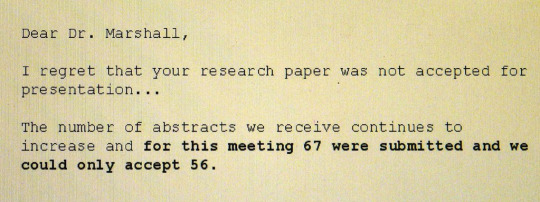
“To gastroenterologists, the concept of a germ causing ulcers was like saying that the Earth is flat. After that I realized my paper was going to have difficulty being accepted. You think, “It’s science; it’s got to be accepted.” But it’s not an absolute given. The idea was too weird.”
A harsh verdict for Barry Marshall, who ranked in the bottom 20% of submitted abstracts for what he judged to be pioneering work. It wasn’t just his work, of course. The Western Australian was training as a gastroenterology doctor and encountered Dr Robin Warren, a pathologist who was trying to find out the cause of painful stomach ulcers, and had in particularly found a bacteria was present in biopsies of almost every patient who had these: Helicobacter Pylori. Not only stomach ulcers, this same bacteria were also seen on biopsies of stomach cancer patients.
Marshall was very interested in Warren’s findings, and opened the history books to investigate this spiral bug which was first described in 1893, and even suggested to have a link with ulcers back in 1940. Why had the theory linking it with ulcers disappeared in the forties? The answer is that the doctor who suspected this, again based on patients who had the organism, was encouraged to stop his research because it “wasn’t easy to prove” to the scientific community. The consensus was that bacteria couldn’t survive and thrive in the stomach acid, so would there’s no way that it could contribute to ulcer formation. Imagine if this link had been discovered four decades before.
Ulcers were caused by stress — this was the status quo. Other challengers over the decades came and went. One of these, John Lykoudos, was fined by Greek health authorities when he refused to stop giving people with ulcers antibiotics.
But Marshall and Warren did not mind being scientific pariahs. They believed that this perception was wrong. Marshall would not give up on the hypothesis that these bacteria cause gastric ulcers, and increase the risk for stomach cancer.
“If I was right, then treatment for ulcer disease would be revolutionized. It would be simple, cheap and it would be a cure. It seemed to me that for the sake of patients this research had to be fast tracked. The sense of urgency and frustration with the medical community was partly due to my disposition and age. However, the primary reason was a practical one. I was driven to get this theory proven quickly to provide curative treatment for the millions of people suffering with ulcers around the world.”
However, Marshall’s work was met with scepticism wherever he went.
“There was interest and support from a few but most of my work was rejected for publication and even accepted papers were significantly delayed. I was met with constant criticism that my conclusions were premature and not well supported. When the work was presented, my results were disputed and disbelieved, not on the basis of science but because they simply could not be true. It was often said that no one was able to replicate my results. This was untrue but became part of the folklore of the period. I was told that the bacteria were either contaminants or harmless commensals”.
There was, of course, another motivation to the lack of interest with Marshall’s work.
“I tapped all the drug companies to request research funding for a computer. They all wrote back saying how difficult times were and they didn’t have any research money. But they were making a billion dollars a year for the antacid drug Zantac and another billion for Tagamet. You could make a patient feel better by removing the acid. Treated, most patients didn’t die from their ulcer and didn’t need surgery, so it was worth $100 a month per patient, a hell of a lot of money in those days. In America in the 1980s, 2–4% of the population had Tagamet tablets in their pocket. There was no incentive to find a cure… I had this discovery that could undermine a $3 billion industry, not just the drugs but the entire field of endoscopy. Every gastroenterologist was doing 20 or 30 patients a week who might have ulcers, and 25 percent of them would. Because it was a recurring disease that you could never cure, the patients kept coming back”
These portentous pecuniary walls did not faze Marshall. With immense commitment to his cause, he decided to take things a step further. He stuck to his guns and took a shot of H.Pylori himself, stirring the bug which he took from the gut of a sick patient into a broth.
“I swizzled the organisms around in a cloudy broth and drank it the next morning”
He did not know what to expect, and was fine for a few days. But then he started vomiting and his breath became awful, and he started feeling exhausted. His wife found out, which didn’t rule out the stress hypothesis, but these were the first time he had experienced stomach inflammation symptoms in his life. He arranged an endoscopic biopsy on himself to confirm the diagnosis, treated himself with antibiotics and was cured with no lasting effects. He was convinced.
But unfortunately, others weren’t. Marshall’s research was on the verge of obscurity. In 1984, Aussie Tabloid The Star caught wind of this. Previously the domain of alien abduction and celebrity gossip, they printed the headline:
“Guinea-pig doctor discovers new cure for ulcers … and the cause”
Amazingly, this headline from a tabloid newspaper piqued the interest of scientists and funding providers, and gradually incepted the idea that this might be something worth looking into. Patients starting hearing about it, and came to Marshall asking to be given antibiotics. It took a few more years for enough other doctors to try out the “charlatan” treatment suggested in the rag and asked for by their patients, and be shocked and swayed by the results. It’s hard to find another example of tabloid health journalism having such a positive long-term impact.
Over ten years after his paper was first rejected, the National Institutes of Health (NIH) held a summit and released a statement to say:
The key to treatment of duodenal and gastric ulcer was detection and eradication of Helicobacter pylori.
Eleven years after that, Marshall and Warren were given a Nobel Prize “for their discovery of the bacterium Helicobacter pylori and its role in gastritis and peptic ulcer disease”. Ulcers were transformed from a chronic and disabling condition to a much more curable one. The standard of care for an ulcer is now treatment with an antibiotic, and stomach cancer is all but eradicated from the Western world.
Marshall’s figurative middle finger to the scientific community underlined the point that people shouldn’t just reject a theory because it contradicts what was previously believed. If medical journals are gatekeepers for the status quo, maybe something needed to change.

Question everything: Science should be a constant process of curiosity and re-evaluation. Marshall had to drink a shot of spiral-shaped bugs and get picked up by a tabloid paper to show that.
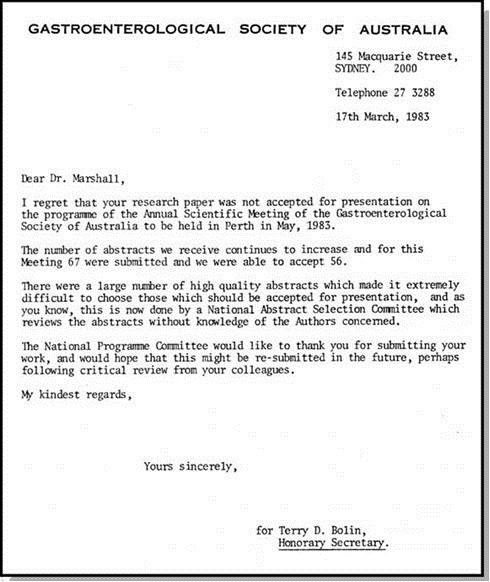
#science#health#medicine#nobel#nobel prize#healthcare#ulcers#stomach ulcers#status quo#medical#doctors#doctor#med school#medical school#inspiration#motivation#question everything#questions
1 note
·
View note
Text
Has Anyone Heard of The Left/Right Game?
by NeonTempo
Part 1 | Part 2 | Part 3 | Part 4 | Part 5 | Part 6 | Part 7 | Part 8 | Part 9 | Part 10 (Final)
A few points before we start.
Firstly, I am not the protagonist of this story. I just went to university with her, and though she went on to become a professional writer, I most certainly did not. She'll be taking over from me further down but, until then, please forgive my slightly awkward delivery while I give you guys the necessary context.
Secondly, I don't know what you will make of the following events, and I'm sure many of you might consider it all some sort of hoax. I wasn't present for any of what transpired in Phoenix, Arizona but I can vouch for the person who wrote the following logs. She is not, and has never been, a fantasist.
Ok so I once knew a girl called Alice Sharma. She was an undergrad at Edinburgh Uni the same time I was. My educational poison was History, a degree which has greatly benefited my career as a bicycle repairman. Alice Sharma studied journalism, though perhaps "studied" isn't the word. It's not an exaggeration to say that she lived and breathed the subject. Editor-in-chief of the campus paper, recognisable voice of student radio. She was frustratingly tunnel visioned, and she was a journalist in her own right before anyone gave her a professional shot.
We met in student halls and became friends almost immediately. A meandering waster trying to stay off his parent's farm and an intrepid, ambitious reporter may not seem the most obvious pairing, but I learned not to question it. She was inspiring, and smart and she proofread all my essays. I’m not too sure what she saw in me.
We were eventually flatmates down in London where she chased her dream and I chased my tail. She got a few jobs here and there, but nothing befitting of her skills. After months of fruitless internships and rejections, Alice called a flat meeting, telling us that she was moving to America, accepting a position chasing stories for National Public Radio. The job had come out of the blue, the result of a hail mary application she thought had been dismissed out of hand. We threw her a bittersweet going away party and put the room up for rent.
That party was the last time I saw Alice Sharma. She dropped out of contact a few months after her departure. Complete radio silence. I assumed she was just busy so I carried on with my small but happy life, and waited for her to pop up on television with some important words below her name; Chief Correspondent, Senior Analyst… something like that.
The radio silence was broken last week, and, for reasons you’ll glean further down, I’m less happy about it than I would’ve thought.
Arriving home from work I found a lone email in my otherwise bare inbox. An email that would later be described as "suspicious" by my tech literate friends. Despite being born in the early 1990's I didn't own a computer until uni, and I've missed several important lessons in the world of cyberspace. Lessons like "Don't call it Cyberspace" of course and more importantly, "Don't open emails with no text, no subject and no sender's address."
I realise most of you would have deleted this anonymous, blank email immediately, my friends certainly would have, but beyond my basic ignorance about online safety, something further compelled me to open it. The only thing of substance in the entire message was a zipped folder, labeled:
Left.Right.AS
I don't have to explain what I was hoping those final initials stood for.
Opening the zipped folder I found myself staring at a stack of text files. Each one titled with a date, continuing sequentially from the very earliest file "07-02-2017". (To any Americans in the room this is the 7th of February).
I’ve since read the files a few times, and shown them to some friends. They don't know what to make of it either, but they certainly aren't as concerned as me. They think Alice is just in a creative writing phase and, if I didn't know her, I’d have to agree. But the thing is, I do know her. Alice Sharma only cares about the truth and if that's the case with these files, insane as it may sound, then it’s very possible my friend has documented her own disappearance.
The people who suggested this forum said you discuss strange occurrences etc. If you guys have come across anything to do with the below, or know any of the people involved, then please send any information my way.
Has anyone here heard of the Left/Right Game?
The Left/Right Game [DRAFT 1] 07/02/2017
They say great stories happen to those who can tell them. Robert J. Guthard is an exception to that rule. As I sit at his table, sip his coffee and listen to him recount the past 65 years it sounds like he's reading off a shopping list. Every event, his first job, his second wedding, his third divorce, none of them receive more than one or two sentences. Rob plows through the years, the curt, dispassionate curator of his own personal history. Yet the story itself is so fascinating, so rich with moments and so wildly meandering that it somehow stands on its own merits.
It's a great story, no matter how you tell it.
By the time Rob was 21, he'd gotten married, had a son, worked as a farmer, a mover, a boat engineer, and grown estranged from his spouse... Here's him talking about that.
ROB: Course my wife started to get dissatisfied, I was away a while.
AS: For work?
ROB:Vietnam.
AS: You were in Vietnam? How was that for you?
ROB: I ain't never been back since.
That was everything he had to say concerning his first divorce, and the entire Vietnam war.
Rob had four marriages after that, and even more professions. After the war he worked with a firm of private detectives, got shot at once by the mob, then he became a courier, which is how a poor boy from Alabama got to see the world.
ROB: I been to most of the continents with that job. I been to India. You from India?
AS: My mum and dad are from India yeah.
ROB: See I could tell.
He'd been arrested once in Singapore, after one of his packages had been found to be full of white powder. He spent three days locked up before someone got around to checking the substance. It was chalk.
A friend he made during his brief custody, Hiroji Sato, invited Rob to stay with him in Japan. Just getting over the breakup of his third marriage, Rob took the offer. He stayed in Japan for another 5 years.
ROB: The Japanese are good people. Good manners. But they got all these urban legends and ghost stories that Hiroji was crazy for, spent all his free time chasing them down. Like, you heard of Jorogumo?
AS: I don't think so"
ROB: Well she's this spider lady lives in the Joro Falls round Izu. Meant to be real pretty but real dangerous. Hiroji took us out there to get a picture of her.
AS: Did you ever meet Jorogumo?
ROB Nah she didn't show. None of them did. I didn't believe at all until we went to Aokigahara
Aokigahara, affectionately titled the Suicide Forest. The next stop on Rob's adventure. It's an area of woodland at the base of Mount Fuji, a notorious hotspot for young people looking to take their own lives. Hiroji, Rob's ghost obsessed jailmate turned best friend, took him to Aokigahara to chase "yurei" the ghosts of the forest.
AS: Did you find anything? In Aokigahara?
ROB: Well I ain't gonna ask you to believe me. But I was a PI. Professional cynic. Even I can't deny there was a spirit in those woods.
From that moment on, Rob's sentences start getting longer. A childlike excitement creeps into his voice. I get the distinct feeling we're moving beyond background, beyond Rob Guthard's old life, and towards his new one. The one he wants to talk about. The one that led him to contact the show.
ROB: It walked up to me through the trees. Looked like static you see on a TV screen but it had a human shape almost.
AS: Almost?
ROB: It was missing an arm. It reached out to me but I bolted outta that forest so fast. Hiroji never saw it, holds it against me to this day.
Hiroji had good reason to be annoyed. Rob says that Mr Sato had been going to the forest 2-3 times per year for three decades. To have a rookie come along and claim to have seen a yurei on his first trip? I'd be more than a little cranky.
But Rob didn't stay a rookie for long. In fact, it was in those woods that he discovered his current passion. The supernatural, or more accurately, the documentation and investigation of urban legends. Legends like Bloody Mary, the Jersey Devil, Sasquatch. Rob has looked into them all.
ROB: I figured if one was true then who knows how many others could be.
AS: How many have you proven so far?
ROB: Since Aokigahara? Ain't none of em had any proof to em. Except for one. That's why I called you guys up.
At this point, Rob can’t hope to repress his smile.
The Left/Right game appeared on a paranormal message board in June 2016. Only a few people frequently visited the forum and, of these regulars, only Rob took an interest in the post.
ROB: The whole thing had a level of detail you don't see in other stories.
AS: What details grabbed your interest?
ROB: Logs. High quality pictures. The guy documented everything, said he wasn't gonna play the game anymore. I think he wanted somebody to keep investigating.
AS: And you were that somebody.
ROB: That's right. I set about trying to verify his information right away.
AS: And how did it go?
ROB: Well... It didn't take long to realise the Left/Right Game is the real thing.
The rules of the Left/Right game are simple. Get in your car and take a drive. Take a left, then the next possible road on the right, then the next possible left. Repeat the process ad infinitum, until you wind up somewhere... new. The rules are easy to understand, but Rob says their not so easy to follow.
ROB: There ain't all that many roads where you can turn left and right and left and right and keep going. Most of the time you find yourself at a dead end or needing to turn in the wrong direction. Phoenix is built on a grid system so you can keep going left and right as long as you need to.
AS: Did you move to Phoenix for the Left/Right game?
ROB: That's right.
I try not to seem incredulous. Selling your house in another state, packing up and moving your whole life to Phoenix, Arizona just to play a game you saw on the internet? It seems like insanity. Rob smiles as he reads my expression. I can clearly read his expression too. "You'll see." It says. "Just wait."
I wouldn't have to wait long. Included within the 9 page submission Rob sent our show, was a long list of suggested items the chosen reporter should bring with them. Clothes for three days, a pocket knife, matches, bandages. There were also a set of qualifications the reporter should have. The ability to drive, basic vehicle maintenance and its human equivalent... first aid training. He didn't just want to talk about the Left/Right Game. He wanted to take one of us along.
Rob leaves a short while later to embark on a few errands, "Prepping the Run", as he calls it. He shows me to the guest room and we part ways, on good terms but very much aware of the other's poorly veiled opinions. He knew I saw him as a charming obsessive, chasing after a fairy tale. He saw me as a naive cynic, on the cusp of a new world. All I could think as I heard the front door close is that by tomorrow afternoon, one of us would be right.
More after this.
When I wake up the next morning, Rob is in my room, holding a tray which he'd knocked on the bottom of to rouse me. I don't manage to record the start of our conversation.
ROB: - I got bananas, strawberries, chocolate syrup. We got some more downstairs but I wanted you to wake up to something good. We won't be eatin' this stuff on the road."
Rob has made me waffles. He sets them down on the night stand and talks through the coming day as I eat. I'll admit it feels a little uncomfortable, waking up in a stranger's home to find said stranger already standing over me, but I quickly move past it. I tell myself that he’s an older man, accustomed to living alone in his own house, not usually having to think about boundaries. Anyway, he certainly knows his way around a waffle iron.
ROB: We hit the road at 9. I wanted to give you time to get ready before everyone shows up.
AS: There are other people coming?
ROB: We got a 5 car convoy on the road today. They'll be here in an hour.
This is the first I’ve heard of a convoy, and to be honest I’m surprised. The game is Rob's obsession, and I’m here at his request. The idea that anyone else would have an interest in today's drive is a little perplexing.
Half an hour later, sated, showered and dressed in the "functional clothing" Rob had so painstakingly outlined, I take my pack out to the porch. Rob’s already there, waiting for his associates to show up.
AS: I thought you'd be conducting a few more errands.
ROB: If you ain't prepared by the morning of, you ain't prepared.
AS: Hah ok I guess that's fair. Oh, Rob is the garage locked? The inside door won't budge and I wanted to mic up the car.
ROB: Yeah it's locked up I'll open it for ya.
AS: Thank you.
ROB: In fact it's about time I wheeled her out. Fair warning Ms Sharma, she's a thing of beauty.
To Rob Guthard, beauty took the form of a dark green Jeep Wrangler. Rob climbs in and lets it roll out of the garage, where it dominates every inch of driveway. The car is large; four doors with a roof enclosing the entire compartment. It’s also been modified extensively, yet another example of Rob's dedication to the game.
ROB: What're you thinking?
AS: I think you're two caterpillar treads short of driving a tank.
ROB: Hah yeah I fixed her up good. I put the winch in, heavy duty tires, the light rig on top is LED's. They'll make midnight look like noon but they don't use hardly any power.
AS: Aren't Jeeps open top usually?
ROB: Not all. This is the Unlimited. I like to have a covered car when I head on the road.
I climb in and stow my pack. Rob had removed the back seats to afford more storage space. The place is packed to the brim. Jerry cans of gasoline, barrels of water, rope, snacks and his own neatly packed set of clothes.
I wonder if the rest of our convoy would take the game so seriously.
ROB: We got Apollo coming up in 10 minutes. No one else has given me a time. I sent the schedule weeks ago, this always happens.
AS: His name's Apollo?
ROB: That's his call sign. Apollo Creed I think he said.
AS: Why are you using call signs?
ROB: Did I not tell you? Oh yeah we're gonna use call signs on the road, keep communication clear.
AS: What's your callsign?
ROB: Ferryman.
AS: ... What's my call sign?
ROB: I thought about it. I was thinking London, you're from London right?
AS: I'm from Bristol.
ROB: Bristol? That’s fine I guess.
It’s less than ten minutes before Apollo turns the corner. Rob jumps out of his chair and paces briskly over to the edge of his property, as his first guest pulls up and steps onto the sidewalk.
Apollo vaguely resembles his namesake, dark skinned, tall and noticeably well built, though it’s clear he couldn’t be less of a fighter. This Apollo Creed is all smiles and seems to have a penchant for laughing at his own jokes.
AS: How far have you come?
APOLLO: I've come out of Chicago. Took three days hard driving.
AS: And you know Rob from the forums?
APOLLO: Everybody knows Rob, Rob's the god! Ahaha
Rob walks over to Apollo's car, gesturing him over to talk shop. Rob’s clearly impressed with Apollo's choice of vehicle, a blue Range Rover packed to the ceiling with kit. I was more impressed with Rob himself. Somehow this 65 year old farmer's son had become respected in a vast online community. My dad is Rob’s age and he's just discovered copy and paste.
The rest don't take long to arrive. Two Minnesotan librarians, also around Rob's age, pull up in a grey Ford Focus. They’re brother and sister, and they've shared ghost hunting as a hobby their entire lives. I find it hard to suppress a smile when they meekly introduce themselves as Bonnie and Clyde.
CLYDE: We would have gotten here sooner we had to drop by to get some blankets. Pleasure to meet you ma'am.
AS: Pleasure to meet you too.
CLYDE: Would you be the journalist?
AS: That's right.
CLYDE: You used to write for the town paper didn't you?
He's talking to his sister there, she nods. Clyde is clearly the spokesperson for the pair, yet they both seem incredibly shy. Whether they admire the famous outlaws, or just the name, it's pretty clear they couldn't be more different from the real thing.
Next to show up are Lilith and Eve, English Lit students at New York University and proprietors of the YouTube channel Paranormicon. Unlike Bonnie and Clyde, Lilith and Eve have no issue holding a conversation. As soon as they learn who I am, and what I do for a living, they attempt to conscript me for an expedition to Roswell.
LILITH: We have a friend there, he's been seeing some-
EVE: -He's a seismologist
LILITH: Yeah and he's been recording readings over the years that show subterranean movement. Predictable movement.
EVE: We're going to see him in July, but we could work it around you if you're free.
AS: I'll have to check my schedule
EVE: OK cool let me give you my email...
They quickly hurry off to film an intro for their latest video, featuring a quick interview with Rob, who seems pretty welcoming of the attention.
The last two cars arrive within a few seconds of each other. A lithe, strong willed older lady who goes by Bluejay and a younger man going by the callsign “Ace”. Bluejay has arrived in a grey Ford Explorer. Ace, much to Rob's annoyance, has arrived in a Porsche.
ROB: Did you think that's gonna help on the road? I didn't write that-
ACE: It's my car. What am I meant to do,? It's my car.
ROB: You didn't read my itinerary, you got nothing packed in there.
ACE: I did read it sir OK? Calm down. I have a bag, I won't ask you for anything.
ROB: Well I know that's true.
Ace and Rob were off to a bad start. Ace takes a phone call, and despite my best efforts to get an interview with Bluejay, she doesn't seem interested in talking to a journalist.
With five cars, and seven travellers waiting for a green light, Rob hands out radios and charging packs, then launches into a quick safety briefing. Wear seatbelts. Stay in position. Communicate clearly and often. It’s at this moment I start to feel a little dismay. I like Rob, and clearly so does everyone else. He'd convinced all of them to drive across the country to join in with his game. I start to worry what will happen in the likely event that the whole thing isn’t real. Would Rob lose the respect of his peers? Would he accept failure when it comes? After seeing the effort he’s put into these runs, the next few hours have the potential to be wildly uncomfortable.
With a smile and a few encouraging words, Rob ends his briefing and beckons me over to the Wrangler. I clamber inside and make myself as comfortable as possible.
ROB: You ready for this Bristol?
AS: I'm ready.
ROB: Ok then let's hit the road.
The Wrangler pulls out of the driveway, and the convoy follows in order of arrival. Apollo, Bonnie & Clyde, Lilith & Eve, Bluejay and Ace keep a steady pace behind us as we come up to the first corner.
Rob slowly and deliberately turns left, checking on the others in his rear view mirror. He looks back to the road as Ace’s Porsche completes the first turn of the game. Shortly afterwards, Apollo checks in on the CB radio.
APOLLO: This is Apollo for Ferryman. How many to more go Rob? ahahaha
ROB: Hah as many as it takes.
I can tell Rob wanted the to reserve the radio for something other than Apollo's quips. But he seems to like Apollo enough to let it slide. I'm not sure Ace would have received the same treatment. We take the next right, then another left. Now safely assured that everyone's following correctly, Rob speaks my thoughts aloud.
ROB: You're wondering the same thing Apollo is.
AS: What do you mean?
ROB: You're wondering how many turns we're gonna take before we hit some wall or something. Before you find out this is all just a story.
AS: Does that disappoint you?
ROB: I'd be disappointed if you weren't thinking something like it. But now we're on the road I gotta say something and you gotta listen to it.
AS: OK...
ROB: We're coming up to a tunnel soon. Any time before we reach it you can get out, walk in any direction you like, and you won’t be in the game no more. Once we go through, you gotta retrace the route we took to get yourself back out that tunnel. That's when you’re home. And you gotta convince someone to take you back in a car coz I ain't ferrying you back 20 minutes in. You got till the tunnel to skip out on this, understand?
AS: I understand. Though I have to say I'm getting little nervous.
ROB: Ain't nothing wrong with a little nervous.
We've taken 23 turns by this point. Already I feel like we're traversing the city pretty effectively. Rob's heavily modified Wrangler solicits a few impressed glances from passersby, as well as several honks of respect from other Jeep drivers. Other than those few moments, everything seems completely indistinguishable from a regular morning drive. I even start to worry if there’ll be anything at all for this story. “Reporter Takes Drive With Interesting Man” isn’t exactly Pulitzer worthy.
Turn 33 leads us onto a short, unassuming street. A row of small businesses in a quiet Phoenician neighbourhood; liquor, second hand clothing, tools and, at the end of the street, a little shop selling antique mirrors. Ten or so people shuffle along the sidewalk, smiling, talking, planning their weekends. The only lone person is a young woman in a grey coat..
I briefly glimpse her at the end of the street, standing on our next corner, the back of her coat reflected in fifty old mirrors. Even from a distance I can see that she’s sullen, wide eyed and nervous. She shifts constantly on her feet, tugging at the button of her coat.
I look away to write some notes as we roll down the street. When I look up again, the woman is standing by my window, staring right at me. She’s smiling, a wide, unfaltering grin that seems almost offensive in its complete insincerity.
GREYWOMAN: Lambs at the gate. Hoping for something better than clover when all they find are things worse than slaughter.
AS: Rob what's happening?
ROB: Ignore her.
GREYWOMAN: He wanted to leave me so I cut him out. The lake was hungry it drank the wound clean.
AS: Miss, are you alright?
The smile vanishes, it snaps from her face and suddenly, the woman is furious.
GREYWOMAN: What do you think you're doing?! Have you gone mad?!
I reflexively press myself back in my chair as the woman, wild eyed and gaunt, slams her fists against my window, with every intent of breaking through.
GREYWOMAN: Would you dance down the lion’s tongue? It will shred you, you whore! It will shred you down to your sins! You fucking bastard!
Rob puts his foot down, and the Wrangler rolls defiantly away from the woman. As we turn the corner I watch her as she wretches, her every movement cradled in abject hysteria. She yells despairingly at the rest of the convoy, bursting into tears when the last car passes her by.
As she shrinks into the rear view mirror, I see her turn to a large mirror on the side of the shop, which the owner is in the process of polishing. I watch as she walks up to it, and with a convulsant scream, slams her head into the glass.
The mirror cracks around her forehead, the owner jumps back in shock, and as the woman pulls her head from the mirror's surface, the fractured spider’s web is dripping red. It all happens in a split second, and she quickly swerves from my view as we take the next left.
AS: Rob, what was that?
ROB: She's there sometimes.
AS: On that street?
ROB: On the 34th turn.
AS: Who is she?
ROB: I don't know. She's never acted out that much before though. Must be a special trip.
I find Rob's lack of concern a little unpleasant, and his implication that this woman's ravings were the symptom of an internet game leaves me more than a little perturbed. As I see it, there are a few explanations for what just happened, and none of them lead to a comforting conclusion.
If we had just encountered a bonafide crazy person, then one could argue that Rob is just seeing what he wants to see. Maybe he'd bought into the game’s story so much that every strange but explainable occurrence would be rationalised as the next step in his favourite paranormal narrative.
Alternatively, the woman could have been an actor, a more elaborate theory sure, but not unheard of. People have lied to the show before and Rob was receiving a tonne of publicity for this attempt from Lilith, Eve and I. I admit, Rob didn't seem like a liar, but good liars never do.
There is a third alternative however. An alternative which, if you put logic aside, explains the all troubling little details that I couldn't help but notice. Because as strange as the grey woman was, isn't it stranger that no one on the street would react? I couldn't recall a single glance in her direction by anybody on the sidewalk. Perhaps that theory falls apart when you consider the shock on the mirror seller's face but, when I think about it, he only reacted once the mirror shattered, and even then, I feel like his attention was on the mirror itself.
The radio crackles.
LILITH: Lillith to Bristol. Sara... Eve got that on camera! Do you have audio?
AS: I think it picked her up.
LILITH: My god that was so weird. Can you send us the file when we stop? Can you ask Ferryman when we're stopping?
AS: When's our stopping point?
ROB: For them, in about 30 minutes. For you? Well, you tell me.
Rob turns off a busy street just before a large intersection, onto a much quieter stretch of two lane road. Ahead of us the road slopes downward, leading into an underpass, which disappears into darkness.
We'd arrived at the tunnel.
AS: What is this supposed to pass under?
ROB: Ain't supposed to pass under anything, it's just there.
AS: And if we weren't playing the game?
ROB: Then it won't show. The question is, are you playing the game or not?
Rob turns to me. It’s the first time he’s taken his eyes off the road since we started. He pulls the car to a slow stop at the mouth of the tunnel.
ROB: You get out now you can go wherever you wanna go, but through there you'll need a car to get yourself home and, like I said, mine ain't turnin round for a long while. You understand?
It’s a dramatic statement, but unsettlingly, it doesn’t feel like he’s attempting to dramatise. It feels like I’m having something genuinely asked of me. Am I ready for what’s to come? Do I accept the risks involved? Do I consent to be taken down this road, and the next road, and the next? Am I prepared to see this game through, real or otherwise, to its end?
AS: What are you waiting for?
Rob smiles, and turns back to the road. He picks up the CB radio holds down the button on the side. The microphone crackles.
ROB: This is Ferryman to all cars. Anyone want to step out then pull to the side now. Otherwise, stay in formation and have some supplies at hand. We got a long ways to go.
Much like the game I’m so tentatively playing, my view of Robert J. Guthard seems to change direction frequently. I’d heard all about his life, but I’m sure that I know him. I like the guy, but I’m not certain that I trust him. And though I admire his dedication to the Left/Right Game, I’m not sure I’ll like where it might lead us. Yet as he takes us into the tunnel, his face vanishing and reappearing under the dim sodium lights, I can that tell he expects this trip to be a major step in his already impressive story, and this time, for better or for worse, I’m along for the ride.
173 notes
·
View notes
Text
Mr. Soul! Review: TV Has Never Been So Radical
https://ift.tt/eA8V8J
Just past the halfway point in the documentary Mr. Soul!, poet Felipe Luciano calls Ellis Haizlip “the most effective, insidious revolutionary that I have ever met.” It isn’t meant as a specific accolade, but it is a badge of honor for a man who honored the true meaning of sedition. Subversion in the arts is a skill which can be expressed as simply as putting a mustache on the Mona Lisa. Seditious political expression is rarely so subtle. The creator and host of the all-too-short lived public television variety program Soul! achieved a dream mix of diverse thought, some which went under the radar, some designed to be unnoticed, all of which was riveting, and everything absolutely accessible.
Soul! captured everyday insurrection. Melvin Van Peebles’ 1971 independent feature Sweet Sweetback’s Baadasssss Song proclaimed to be unapologetically Black, Haizlip saw no reason to bring apology into the equation. Nothing he was doing, no act he was showing, no poem or word or emotion needed clarification, only amplification. Everything Haizlip brought to the soundstage was an ordinary pain or exultation expressed with unadulterated realism. Yet, it subverted every expectation, and proved a street battle could be fought on the airwaves. In 1970, Gil Scott-Heron frustratingly sang “The Revolution Will Not Be Televised,” but from Sept. 12, 1968 through March 7, 1973, not only was a coup mounted on small screens, but it had great beats you could dance to. Even the spoken word performances had rhythm, the oral arguments and affirmations of the interviews were lyrical blasts of staccato, flowing, chaos.
Patti LaBelle was the first musical guest. Backed by the Bluebelles, their voices brought home audiences “Somewhere Over the Rainbow.” Stevie Wonder got so caught up in the energy of the studio audience, cameramen had to change reels and excitedly wondered if he would ever get tired of playing. Earth, Wind & Fire showed how live playing on TV could be done. There was no lip-syncing on Soul!. It would be another few years before Soul Train would answer for American Bandstand, but Soul!’s host Ellis Haizlip never tried to be a hip Johnny Carson.
Mr. Soul! is the story of the man behind the first Black variety show on American television. The documentary explains how the March 1968 Kerner Commission Report found the media played a big part in the racial divide in America. Black Americans rarely saw themselves reflected on the small screen. Shows with African-American actors, stars, and hosts had been produced by networks, but most were only short-lived, no one was really allowed to be themselves, and their social limitations were strictly enforced. African Americans did get one featured role in nationally broadcast network and affiliate television.
The Six O’clock News guaranteed on-the-spot footage. They showed every graffiti-tagged trash can left overfilled on ghettos streets. They fetishized poverty, and promoted riot coverage before the first windows shattered. They didn’t cover much of the burgeoning renaissance which was happening in the culture. Public broadcast stations led the first charge, the documentary details, programming shows like Inside Bedford-Stuyvesant, Say Brother, Black Journal, and Like It Is, socially conscious and educational content made by and for African Americans. Haizlip, was asked to help create a “Black Tonight Show” in the late ’60s. Mr. Soul! shows nothing could have been further from his mind. “What he was doing, every night he was on that program, was changing someone’s mind about Black folks,” poet Sonia Sanchez says in an interview.
The documentary casts the show as much more than a groundbreaking arts showcase. It presents it as an in-your-face avant garde performance art entity in itself. One that could take on any character, as long as it was real. Soul! was also the first true poets’ coffeehouse on television, the film points out, and it danced all over any rhymes the Beats might have snapped to. The Last Poets bounced epithets off percussion onto an audience who shook words like maracas, and fed a need to the people watching at home. Mae Jackson’s words could build a castle of words big enough to transition from the frenetic ensemble jazz of the McCoy Tyner Quartet to the somber acoustic guitar of Bill Withers..
The show also served as a church, its congregation reaching far beyond West 55th Street, the studio at WNET in New York, where it was filmed. The documentary makes a great case for the show as a conduit of spiritual affirmation. Haizlip was brought up in the church, and brought the fervor of his faith in all things Soul!. Wilson Pickett and gospel singer Marion Williams’ rendition of “Oh Happy Day” lifted the faithful off their seats and onto their feet. Billy Preston and the God Squad channeled holy spirit through his fingertips. Meditations proclaiming the inner beauty of blackness raise the very chakras of the viewing community.
The program was a political roundtable, in the round, surrounded by a studio audience constituency, as well. The conversations ranged from the global environment to the nature of creation. The interview guests ncluded Cicely Tyson, Stokely Carmichael, Kathleen Cleaver, Muhammad Ali, Sidney Poitier, Kathleen Cleaver, and Harry Belafonte. Haizlip, who was gay in the world before Stonewall, gets Louis Farrakhan to find a place in the heart of The Nation of Islam for those whose sexuality deviated from proscribed norms. James Baldwin grants more than an interview to poet Nikki Giovanni. The documentary brings out how each of these lives touched one another more than what could ever be shown on screen.
Don’t let this fool you into thinking the documentary is all righteous rage and rhythm and blues. Mr. Soul! has many funny bits, and not just from the performers. Soul! was usually taped live, and this proves to be problematic for the limits of public television. Live broadcasts mean no interruptions and no censorship. Haizlip was brilliant, no doubt. More than educated, he had an inner emotional wisdom which transcends even artistic thought. But he never quite understands the meaning of the word censored. When he’s finally forced to bleep the shit out of a poem by Amiri Baraka on heroin addiction, Haizlip makes sure everyone hears his reluctance to cut it. He instructs the sound engineers to turn the volume way up so the fill-in noise on TV is as ugly as viewers are supposed to think the word is. This is more than a poetic choice. It is a punchline in a running gag.
Everyone interviewed behind the scenes has a funny story. What they are trying to say may be painful, hurtful, or even dangerous. But they know which words bite, and when to chew. Whether it’s the true stories behind the accepted myths or on-the-spot improvisations to cover technical difficulties, each anecdote ends with a shake of the head and an appreciative grin. Haizlip created Soul! with producer Christopher Lukas, who stuck the exclamation point on the title, and brings funny behind-the-scenes stories throughout. The theatrical producer Haizlip took on host duties out of necessity after trying academics, like Harvard psychiatry Professor Dr. Alvin Poussaint. With his horn-rimmed glasses, ultra-calm demeanor, and “right on” encouragements, Haizlip made some big gaffes on live TV. All of these are celebrated gleefully.
President Nixon wasn’t a fan, but the documentary shows he watched. He may not have tuned in, and he certainly wasn’t turned on, but inasmuch as he could be, the paranoid president was aware of the sounds and voice of Black life. Mr. Soul! shows how the Public Broadcasting Corporation suffered a tidal shift in programming after the Johnson administration vacated the White House. The show lasted five years before it was cancelled by the Nixon administration, which cut PBS funding so deep, it needed The Electric Company to pay its bills. But how cool it must be for Bill Moyers to be the only person specifically named, besides the Black cultural programming, as someone Nixon didn’t want to be blamed for silencing.
Mr. Soul!’s finest cinematic achievement is translating a feeling of exhilaration and expectation. Heizlip had an eye toward the future, a radar for young talent, and the sense to balance established acts with rising talent. Dancers like Carmen de Lavallade might find themselves free to experiment with cutting edge moves to a solo piano performance by Stevie Wonder. A 25-year-old Al Green is as surprised as the audience at how much he is instantaneously embraced. Hit-writing songwriters Ashford and Simpson never even thought about performing until they were approached to perform on the show. Haizlip saw art in individuals before even some artists noticed it in themselves.
B.B. King brought old school blues, while jazz be bopper Max Roach teases the future of avant garde jazz. Haizlip asks Rahsaan Roland Kirk, whose innovative, all-inclusive, impresario reed playing laid seed for Jethro Tull, to sit in just because he is crazy.
Haizlip died in 1991. Mr. Soul! was co-directed by Samuel D. Pollard and Ellis’s niece Melissa Haizlip, who also wrote it. The documentary profiles a man who stayed true to his mission by remaining true to himself. He electrified public television through his vision of “Black love and Black strength and Black encouragement.” With a voiceover delivered by Blair Underwood, Mr. Soul! captures a historic run of unique and visionary television. It is as much fun to discover the show as it must have been when it first aired, in a three-networks climate expertly captured in the documentary’s opening, “in living color.”
CNN recently did a special on the history of sitcoms. Everyone watching will remember most of the clips they show, certainly every series they highlight, and almost all the stars in the highlights. There are some very recognizable faces strewn throughout Mr. Soul!, and you really have to keep a sharp eye out at all times, especially in the photographs. Younger versions of household names are all over this documentary, even a 15-year-old Arsenio Hall pulls a rabbit out of a hat.
Soul! is an important chapter of television history, but it feels unfinished because of its unrealized potential. “Can you imagine what Soul! would have been like for a 20-year run,” Questlove asks towards the end of the documentary. “Like, how different would our lives have been?” Mr. Soul! finds hope in the sting of lost possibilities.
cnx.cmd.push(function() { cnx({ playerId: "106e33c0-3911-473c-b599-b1426db57530", }).render("0270c398a82f44f49c23c16122516796"); });
Mr. Soul! launches on HBO Max on August 1.
The post Mr. Soul! Review: TV Has Never Been So Radical appeared first on Den of Geek.
from Den of Geek https://ift.tt/3feXOlL
0 notes
Text
Dracula the Undead: Author’s Note Part 1 Snark
If you enjoy the content you are reading, please like and follow the Center of Stupidity blog.
Interested in reading the previous Dracula the Undead chapter snarks? They can be found here.
Summary: An aperitif of the clusterfuckery that is to come. This is a long-winded and self-congratulating author's note.
Both writers claim that their novel stays true to Bram Stoker's vision even though it contradicts and re-writes the original story.
In case anyone wants to read the original author's note in order to form their own conclusions, you can read it here.
~ Dacre's Story ~
Since I am a Stoker, it is not surprising that I have had a lifelong interest in the work of my ancestor.
At the risk of sounding like a complete ass...
This "interest" is financially motivated.
Bram’s youngest brother, George, believed to be the sibling with whom he had the closest relationship, was my great-grandfather, so I am Bram’s great-grandnephew.
"Which means that I am related to Bram Stoker and can write an 'official' sequel to Dracula. And that will make me a shit-load of money."
In college, I wrote a paper on my great granduncle,
I'm getting the impression that is statement is supposed to make Dacre Stoker sound unique...
Even though there are plenty of other college students who have written an essay about Bram Stoker or Dracula for an assignment.
For instance, yours truly did a PowerPoint presentation on Bram Stoker and Mary Shelley for a class in college.
examining what may have motivated him to write Dracula.
Again, this isn't groundbreaking stuff.
Many people have published articles or books discussing Dracula.
Scholars like Professor Elizabeth Miller have dedicated their lives to studying it.
My research opened my eyes to how, from my family’s perspective, the history of the book Dracula, is pretty tragic.
"And before I give everyone a history lesson, I'm telling you all this so I can justify butchering my ancestor's work."
Bram Stoker died without ever seeing Dracula become popular. The sales of the novel were so limited at the time of his death that his widow, Florence, thought she would never benefit financially from Bram’s “wasted” seven years of research and writing. With Bram’s other fiction and nonfiction books out of print, Florence was convinced she would live out her days on a tight budget.

Actually, that isn't true.
According to scholar John Edgar Browning, the majority of critics gave positive reviews.
His findings were published on February 1st, 2012.
It is important to note Dracula: The Undead was published in 2009.
But in an interview in 2013, Dacre Stoker said this: There is this statement that used to kind of drive me crazy—‘Dracula was met with mixed reviews when Bram was alive’.
He then briefly discusses Browning’s research.
Which means that Stoker knew about Browning’s findings...
But he ignored it and printed misinformation.
Dacre adds that it was only "ten years after Bram’s death" when Dracula became popular.
Posthumously, Bram started to receive recognition as the progenitor of the modern vampire/horror novel.

Not to diminish Dracula and its impact on popular culture...
But it is not the first influential vampire novel.
Varney the Vampire is.
Dacre Stoker goes on to talk about Florence Stoker (Bram Stoker's wife) and her legal dispute with the creators of Nosferatu.
He also states that Dracula became public domain in the U.S.A since 1899 because Bram didn't complete a requirement so Florence Stoker had to live off the U.K. royalties.
With the U.S. copyright lost, Hollywood, corporate America, and anyone else was free to do whatever they wanted to Bram’s story and characters.
This is the part where the reader is supposed to boo and hiss at Hollywood...
And then give Holt and Stoker a standing ovation for writing Dracula the Undead.
Dacre Stoker talks about how his family wasn't asked for approval of "any of the hundreds of incarnations of Dracula over the next century."
My father’s generation had a negative feeling for all things Hollywood and Dracula.
Which is understandable given what happened.
But after reading the author's note...
The history of Dracula is being used in order to deflect any criticism.
And to justify bastardizing Dracula under the pretense of honoring Bram's original vision and righting a past wrong.
—except, of course, for Bram’s original novel.
So we have two options:
They knowingly endorsed a novel that defamed Bram and mocked the original novel.
Or they loved Dracula and would be appalled that Bram was dragged through the mud and the original lore was ridiculed.
According to Ian Holt in an interview in 2010, he says that “Bram’s bitter demeanor was even worse in real life than we depicted in the novel.”
And in the same interview, Holt passively aggressively says: “Do your research. The fact that the chapters with Bram were written almost completely by Dacre in consultation with his family means nothing to them.”
So yeah...
I’m leaning towards option number one.
I didn’t write about these issues in my college paper, but they were always on my mind.

Dacre Stoker admitted that he didn't read Dracula until he went to college.
Stoker says it was "a shame" that his family was unable to "control the legacy of my great-granduncle" and "lay claim to the character of Dracula."
It was many years after college that I met an interesting character, Ian Holt.
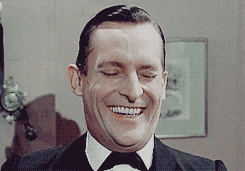
Stoker doesn't realize that calling someone "an interesting character" can be a veiled insult.
Ian is a screenwriter who has been obsessed with all things Dracula since childhood.
A lot of people love all things Dracula.
Doesn't mean that they are a talented writer.
Ian, being a true idealist, had a plan that inspired me to not accept the frustrating history of Dracula.
"He was my knight in shining armor!"
He wanted to change history.
History reveals that change isn't always positive.
Sometimes it is negative.
Ian’s plan was simple: to reestablish creative control over Bram’s novel and characters by writing a sequel that bore the Stoker name.
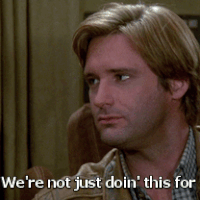
To my surprise, none in my family had ever considered this.
Translation: "Why haven't any of my family members tried writing a novel? It's the obvious solution to the problem."
And it didn't occur to Stoker none of his family members had any interest in being a writer.
It really pisses me off when people act like writing any kind of fiction is easy or that anyone can be a writer.
While any literate person can write, not everyone can be a writer.
It requires talent and passion along with the desire to learn about the craft and improve your writing skills.
Intrigued, I decided to join Ian on a roller-coaster ride as coauthor.
And for readers, it is a nightmarish ride where clusterfuckery gallops and a literary classic is violently raped.
In writing Dracula the Un-Dead, I felt a strong sense of duty and familial responsibility.
"It isn't because I wanted to piss all over my relative's legacy and make a shit load of money."
I hoped to work with Ian to represent Bram’s vision for the character of Dracula.
Bram's vision should be called Sir Not Appearing in This Novel.
We aimed to resurrect Bram’s original themes and characters, just as Bram conceived them more than a century ago.
The Dracula characters appear in name only.
They are cast in an unfavorable light.
As for the themes?
They are discarded.
So many books and films had strayed from Bram’s vision—
It is extremely rare for adaptations to stick extremely close to the original story.
Usually, adaptations take artistic license with the source material.
And just because an adaptation or a retelling differs from the original story, doesn't mean that it will automatically suck.
For instance, I like films, mangas, and video games that are inspired by/loosely based on Dracula.
and thus our intent was to give both Bram and Dracula back their dignity in some small way.

Dracula is depicted as a misunderstood man with fangs who is every woman's erotic dream.
And readers are supposed to despise Bram.
I think Bram would be proud that a family member has taken this initiative, and finally done justice to the legacy he created.

Bram would be livid that his work was bastardized and that his descendant depicted him as a desperate and a talentless hack.
~ Ian’s Story ~
I am not ashamed to say it, I LOVE horror films.
Ah, all-caps.
How I loathe thee.
A lot of people like horror and it is a popular genre.
So that doesn't make you unique.
And horror movies are no longer considered depraved or scandalous.
Holt mentions that his favorite horror movie as a kid was Dracula (1931).
When I was ten years old, my mother bought me a record for Halloween with Christopher Lee narrating the story of Dracula by Bram Stoker. Reading that record sleeve changed my life, for it was then I learned that Transylvania was an actual place and that Dracula was a historical figure.
Where do I begin?
If you are LISTENING to an audiobook, you are not READING IT.
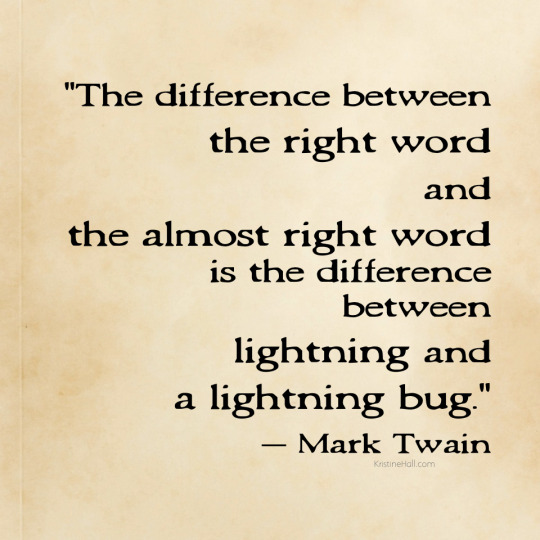
Ian was "inspired" by the audiobook that he decided to read Dracula.
I was surprised at how different the novel was from the films—and I had seen every Dracula film ever made.
"Who knew that Count Dracula swings both ways? Or that Mina is an assertive and intelligent woman and not a stupid Dracula fangirl?"
The novel was more intelligent, astute, and dark.
While this literary abomination is a cash-grab filled with gratuitous gore and sex.
The novel had more intricate and exciting characters than I could have ever imagined.
While Dracula the Undead has depraved lesbian vampires and a whiny prat along with a handsome and misunderstood vampire who only wants tru luv.
I felt cheated by Hollywood. I vowed revenge!
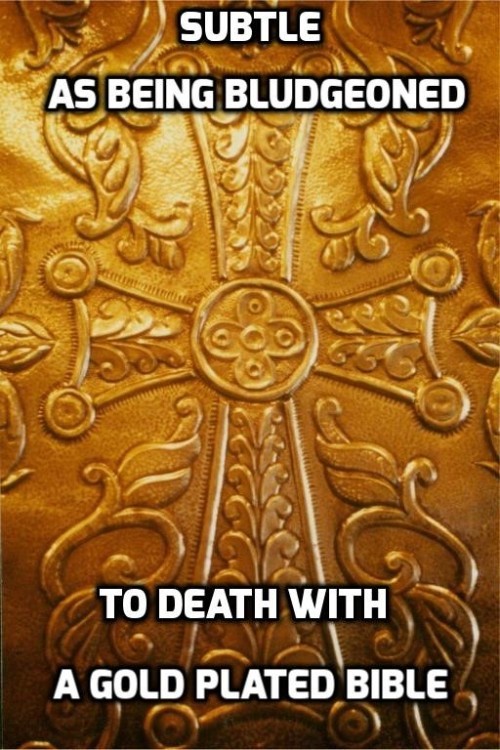
I get it, Holt and Stoker.
I'm supposed to hate Hollywood but adore your literary travesty.
Fifteen years later, my opportunity came.
And Dracula fans wished that it never arrived.
Flipping channels one night, I came upon a program on the making of Francis Ford Coppola’s Bram Stoker’s Dracula.
I'm getting the sneaking suspicion that this story will result in name dropping.
And Holt insisting that he is a scholar.
On the program, Coppola held up the 1972 book In Search of Dracula written by Fulbright Scholars Professor Raymond McNally and Professor Radu Florescu (Prince Dracula’s actual descendant).
Vlad the Impaler is also known as Vlad III, Vlad Dracul or Vlad Dracula.
Sometimes he is referred to as Vlad III of Wallachia or Vlad III, Prince of Wallachia.
But I have never heard of any scholar referring to Vlad III as "Prince Dracula."
A quick Google search reveals only this book and a YA novel called Hunting Prince Dracula.
Every time I see Vlad III being mentioned as "Prince Dracula", I can't keep a straight face.
Because it reminds me of Beni Gabor calling Imhotep his "prince."
Coppola had used the professors’ research of the historical Prince Dracula’s life as inspiration for the opening sequence of his film.
And he discarded the rest of it in order to make Dracula a guy who is looking for his one tru luv.
Before taking a breath I was on a plane to Boston College to meet the professors. After showing them some notes on the screenplay I planned to write based on their book,
"I smelled an opportunity to make some money!"
the professors sold me the rights for one dollar
"They were impressed my awesomeness!"
The friendship I forged with McNally and Florescu has borne fruit in many ways. I soon began traveling with the professors giving lectures on the impact of Bram Stoker’s novel on our culture.

According to Dracula the Undead on the official Penguin Publishing House website, Ian is being described as:

There is a BIG difference between being a fan, a historian, and a documentarian.
A quick Google search reveals that Ian Holt has not published anything in an academic journal.
However, one of the first things that pop up in an internet search is this.
This garnered me an invitation to speak at The First World Dracula Congress in Bucharest, Romania, in 1995—a gathering of Dracula/horror scholars from around the world.
I don't doubt that Holt went to The First World Dracula Congress.
But I don't think he was a speaker.
Elizabeth Miller wrote a report about the gathering.
And Ian Holt isn't mentioned among the speakers.
Holt went sightseeing in Romania and how he made "the dream I had as a ten-year-old come true."
Thanks to the friends I made at the First World Dracula Congress, I was asked to join the Transylvanian Society of Dracula—a scholarly organization dedicated to the study of all things Dracula.

We get it, Ian Holt.
You want us to think that you are a scholar because you are friends with scholars and historians.
But I don't think a scholar would be constantly name-dropping.
Through friends in the society I met Professor Elizabeth Miller, the world’s foremost authority on all things vampire, Dracula, and Bram.
"And I'll use my scholar friends as a shield to deal with criticism."
Professor Miller asked me to speak at the Dracula convention in Los Angeles in 1997, where we celebrated the 100th anniversary of the release of Bram’s novel.
According to a report on the 1997 Dracula convention in Los Angeles, Holt isn't mentioned as being one of the speakers.
Holt says during the convention he came up with an idea to write a sequel to Dracula. He admits that a Dracula sequel isn't a new idea.
But a Dracula sequel was never written with "input from a member of the Stoker family."
Holt goes on to say that "securing that input became my goal" and contacted the Stoker family patriarch.
Still scarred by the Nosferatu copyright affair and years of being ignored and abused by Hollywood, the members of this generation of the Stoker family wanted nothing to do with me.
I could be wrong...
But I'm getting a strong feeling that Holt was miffed that some members of the Stokers didn't want to touch him with a ten-foot pole.
Especially since Holt said the Stoker family at "long last" supported the idea for an official sequel.
But I wouldn’t give up.
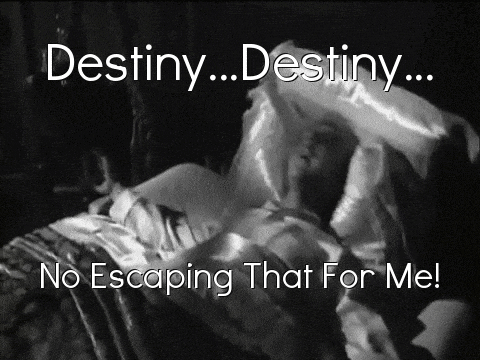
Holt says how he "kept building up my film-writing résumé and Dracula connections." He eventually meets Dacre Stoker.
I pitched him my sequel idea, which at the time I had been planning as a screenplay. Dacre was enthusiastic and suggested that the proper way to proceed was with a book first.
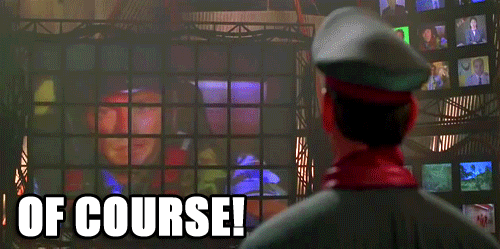
If it is a novel, then it will be proper lit-ra-choor.
Because a movie wouldn't be "deep" or "elevated".
Both Dacre and Ian agreed to a writing partnership.
And Dacre contacted his family members and presented them with the sequel proposal.
Once it was understood that this would be a labor of love,
"We gleefully shit all over the original lore and insist that it was all a lie."
our intentions honorable, and that our plan was to restore to the world Bram’s original vision and characters,
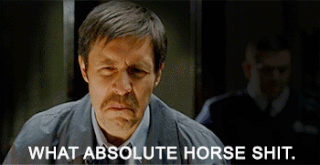
If that was the case, then:
The original lore of Dracula wouldn't be repeatedly violated.
The Crew of Light wouldn't be depicted in an unflattering light.
And Bram Stoker wouldn't be vilified.
the Stokers offered support, at long last.
Translation: They finally appreciated my genius!
Dracula the Un-Dead is the culmination of my lifelong dream and years of hard work.
"And why is the Devil laughing and doing a victory dance?"
It is my gift to every horror nut out there.
If by "gift", you mean a literary turd, then I agree with you.
My greatest wish is we have created a book that is close to Bram’s original gothic vision
"Close to Bram's original gothic vision"?
Hell no!
It contradicts the original story and reads like a shitty Coppola's Dracula fanfic.
—while modernizing it at the same time.
By stealing a twist from The Empire Strikes Back and copying a scene from Indiana Jones and the Temple of Doom.
Believe me, I realize how lucky I am.
And readers will regard this novel as a plague upon mankind.
I have been truly blessed that in some small way, my name will be linked with
a mean-spirited and shitty novel.
that of my hero, Bram Stoker—
I'm not convinced that Dacre or Ian regard Bram as their hero.
Here is an excerpt from the novel:
"If there were to be any truth to Stoker's novel it would have to be where no sunlight could ever reach."
Translation: you can stick it where the sun don't shine.
the man who invented modern horror.
I'll say it again...
Stoker wasn't the only one who invented modern horror.
Some of the other writers were Edgar Allen Poe, Ann Radcliffe, Sheridan Le Fanu, Algernon Blackwood, and H.P. Lovecraft.
#rm renfield#r.m. renfield#quincey p. morris#quincey p morris#abraham van helsing#jack seward#mina murry#mina harker#lucy westenra#Wilhelmina harker#count dracula#dracula#jonathan harker#chapter snark#bad fiction#snark#dracula the undead#dacre stoker#ian holt#arthur holmwood#elizabeth bathory#vlad the impaler#bram stoker#anti dracula the undead
5 notes
·
View notes
Text
The completely unnecessary analysis
by Christopher Smart
April 13, 2021
HEY MORMONLAND — THIS BUD'S FOR YOU
People out in the real world often make fun of Utah — but just because Mormons (almost) never drink and (almost) never swear is no reason to poke fun. The Beehive State has always had the reputation of a place where you can't get a drink. But that's not really true because, according to Wilson and the band, locals always keep a bottle of George Dickel under the driver's seat. Well, listen, times have changed and you can now go to a restaurant and get a drink as long as your children are blindfolded. And lookit, we now have Five Wives Vodka and Polygamy Porter. See, we do have a sense of humor. And now even Budweiser has caught on. The Tribune's booze specialist, Kathy 'Straight-Up' Stephenson, broke the news that specially designed Budweiser bottles will be emblazoned with Utah cuss words, such as, “Oh My Heck” and “Frick Yeah” as part of its “The Beer Utah Swears By” campaign. (We are not making this up.) The labels will have scenes of Delicate Arch and the Wasatch Mountains. But no, the Salt Lake LDS Temple won't grace any beer bottles — that's just a swig too far. Still, you know Utah (Mormon) lawmakers are going to hate this. Can't you just hear them: “We told you, start selling 5 percent beer and everything goes right to shit, er um, heck.”
CROWING FOR JIM CROW
Voter suppression is as American as ball park hot dogs and them suckers at Delta and Coca-Cola should just shut the fuck up, said Sen. Mitch 'Corporate Bucks' McConnell after CEOs from a number of large corporations came out against new Georgia voting laws aimed at restricting minority access. SHOCKER — Utah's Republican congressional delegation got on board with McConnell to push back — hey let's boycott Coca-Cola, Delta Airlines, Porsche USA, UPS, Bank of America and Major League Baseball, who don't know their ass from third base. (Great strategy — just keep digging, guys.) This ain't no Jim Crow, crowed Georgia Gov. Brian P. Kemp, who as secretary of state purged over 340,000 voters just before he ran for governor. He beat Stacey Abrams by less than 55,000 votes. Georgia Republicans tightened up voting restrictions again after Joe Biden won the state as did two Democrats in Senate races. Texas and other states followed suit — Jim Crow who? In 2013 the U.S. Supreme Court in a 5-4 decision cut the heart out of the 1965 Voting Rights Act that required federal oversight of states with histories of discrimination. Voter suppression is no longer a problem, explained Chief Justice John Roberts. Cock-A-Doodle-Do.
LIARS, LIARS, PANTS ON FIRES
The sky is falling and so is our democracy. Lucky thing, seven Democrats are going to save it — the democracy not the sky. Utah's Ben 'Boy Scout' McAdams along with former representatives from New York, South Carolina, Oklahoma and New Mexico, as well as former candidates from New York and Indiana, have created Shield PAC — to shield Dems from GOP bullshit. “Our plan is to counter the torrent of lies that helped cost us our elections in 2020,” they wrote in a column for USA Today. If they're talking about people like Burgess 'I've-Got-A-Secret' Owens, then we can hardly blame them. According to Owens, Democrats are socialists who eat baby parts on pizza. The PAC hopes to get its message out early in 2022 to avoid being labeled commie baby-eaters. “Republicans will lie about [Democrats] because it worked against us and because they have nothing else to run on,” they wrote. “They have abandoned their long-held principles [and] they have no new ideas... ” Don't you wonder what would happen if the Utah Democratic Party did something like that at a grass-roots level? We could have a two-party state. Never mind, they’re too busy eating lunch on the expense account at The New Yorker. (And no, they didn't order pizza).
Post script — Well that's about it for another week here at Smart Bomb where we keep track of those zany Utah Republicans so you don't have to. Speaking of which, Gov. Spencer Cox, the congressional delegation and every Republican who loves freedom and Tasty Cream Donuts has put Joe Biden on notice: If you mess with Bears Ears and Grand-Staircase-Escalante national monuments without unilaterally our permission we will get real mad and hold our breath until... That's pretty rich when you consider it was former Sen. Orrin Hatch who induced the Once and Future King to slice up said monuments after ego massages with happy endings. Trump cut Bears Ears by 85 percent and Grand Staircase by half. Unilaterally, you say? Well, get this: President Obama asked Utah leaders to propose a plan for Bears Ears, but the so-called “Public Lands Initiative” sponsored by former Utah Rep. Rob Bishop was purposely stillborn. Oil, gas and minerals are practically nil there, but these lands and antiquities need protection from what Ed Abbey called “industrial tourism” — exhibit #1 Moab. National monument designations would go a long way toward protecting them. It's too bad it will drive Utah Republicans nuts — or should we say nuttsier.
Well Wilson, you and guys like to roam red rock country to get your minds right. So what do you and the band have that will give us that earthy clean freedom-thing that makes it all worthwhile:
Just listen to the wind blow
Let it blow, let it blow
Sand over my trail
I got my saddle on the ground
And that ol' moon, he can still be found
Hidin' in the desert sky
And when I die let me die
With a dream in my mind
A smile on my face and no trouble behind
And no cross on my grave
To show my restin' place
So I can listen to the wind blow
Let it blow, let it blow
Sand over my trail
I got my saddle on the ground
And that ol' moon, he can still be found
Hidin' in the desert sky...
(Desert Skies — Marshall Tucker Band)
0 notes